11 Ways to Beat Your Post-Travel Depression
:max_bytes(150000):strip_icc():format(webp)/10626503_775084875863647_1149782182633260913_n-56a90ed43df78cf772a33c01.jpg)
It's the moment practically everyone dreads: the end of an amazing trip. Returning home, whether from a two-week-long vacation or a multi-year round-the-world trip, can hit you hard, and this post-travel depression can affect everyone. Sometimes it can even begin in the days running up to the end—you always end up feeling a little sad in the days before heading home. As well as a sense of depression, other symptoms you may experience include lethargy, loss of appetite, a lack of motivation, feelings of nostalgia, and—a great way to cope —immediately researching your next trip.
In all seriousness, though, post-travel depression can seriously affect your mental well-being and last for as long as weeks or months. One huge reason why this is the case is that travel is transformative . After you've explored the world, you'll feel like a different person, but everyone you return to can be the same.
So, what can you do to prepare yourself for post-travel depression, and how can you minimize its effects? These helpful tips will help you get back on track and prepare for another journey.

Keep Busy During the Final Days of Your Travels
© Marco Bottigelli / Getty Images
The last thing you want is for the end of your trip to be overshadowed by a sense of sadness about it coming to an end. To overcome this, make the final few days of your vacation the busiest of the entire trip. This means booking yourself in for classes, taking tours, going shopping for souvenirs, and taking long walks. It helps to keep your mind off the fact that you'll be returning home soon and keeps you enjoying the place you're currently in.
If Possible, Don't Return to Working or Studying Immediately
Klaus Vedfelt / Getty Images
Nothing makes you feel like you've returned to reality with a bang than returning home and immediately throwing yourself back into your old routine. This won't be possible for everyone, but if you're one of the lucky ones, aim to give yourself a few days to transition back into everyday life when you return. If you can't take extra time off, it might be worth arranging to end your trip on a Friday so that you can have the weekend to yourself.
This time will allow you to overcome your jet lag , unpack and do your washing, catch up with friends, or even sort through your memories. Take your time decompressing and the depression won't hit you as hard.
Catch Up With Friends
SolStock / Getty Images
Let's face it: listening to other peoples' vacation stories can be pretty boring, so talking to friends about your trip for any real length of time can be a challenge. When you're battling the post-travel blues, though, this can be a blessing in disguise. Meet up with a friend and chat about what you've been up to in your time apart. Sure, you'll get to share stories from your travels, but you'll also hear about the fun things they've been up to while you've been gone. This will help keep you distracted and lessen your attention on how you wish you were still abroad.
Attempt to Maintain the Mindset of a Traveller
Hinterhaus Productions / Getty Images
When you travel, you'll often find yourself with a different mindset. On the road, you may be all about trying new things, signing up for fun experiences, and eating as much good food as possible. But when you live somewhere, you tend to eat at home, fall into a routine, and rarely sign up to try anything new. This lifestyle definitely doesn't help to boost one's mood.
Keep the buzz of excitement that comes with travel alive by maintaining the mindset of a traveler. Take a cooking class in your hometown, continue with surf lessons, take a dance class or two, and treat yourself to a nice meal every couple of weeks or so.
Travel in Your Backyard
J.C. Leacock / Getty Images
Who says that travel has to end when you return home? After returning home, plan to explore where you live as if you were a tourist. Take a walking tour, jump on a tour bus, take a cooking class, visit the most famous monuments, and take tons of photos. You could even plan a museum-hopping day to learn more about the history of your hometown.
After traveling and returning home with this mindset, you might find that your hometown is a fascinating place to visit.
Share Your Photos With Friends
Teera Konakan / Getty Images
Relive your vacation by sharing your photos with friends on Facebook and Instagram. It'll make you feel as though you're being productive and cheer you up as you look back on your happy memories. Be careful with your privacy settings if you're not comfortable with sharing your vacation with the entire world, though.
Re-Read Your Travel Diary or Travel Blog
Westend61 / Getty Images
Many love to keep a record of those life-changing moments during their travels. If you decided to keep a travel diary or blog throughout your trip, spend some time reliving the best experiences and looking back on what you learned when you return home.
If you didn't want your writing to take away from your trip, now could be a good time to start a blog. You can reminisce about the best parts of your journey, share your thoughts and feelings about coming home with your friends or anyone else who stumbles upon it and use it as an opportunity to go through and edit your photos.
Find a Place for Your Souvenirs
David Cleveland / Getty Images
If you purchased souvenirs on your trip, spend time organizing them and working out where to place them. It'll help fill your home with happy memories and inspire you to keep seeing the world.
Start Planning Your Next Trip
JGI/Jamie Grill / Getty Images
One of the best ways to take your mind off the post-vacation blues is by planning your next trip. Start by sitting down and coming up with a list of everywhere you dream of visiting. Next, start coming up with a plan for how you can make it become a reality. With a new focus in your life, you'll have something to keep your mind off of your previous trip.
Start Taking Care of Yourself
Luis Alvarez / Getty Images
When we travel, it can be hard to take proper care of ourselves. Maybe you ate out for every meal and are feeling unsettled from all that rich food; maybe you spent two weeks lying by the pool while letting your exercise routine fall apart, or maybe you spent every night drinking and dancing and are desperately craving a good night's sleep.
Travel isn't always great for us, so take your return home as an opportunity to start caring for yourself. Decide to eat healthily for a while, join a gym, run, head to a spa, or get an early night. Taking good care of yourself should help reduce your post-travel blues.
Help Out Other Travelers
Tony Anderson / Getty Images
While traveling, you likely ended up relying on the kindness of strangers at multiple points throughout your trip. Whether it was a friendly local who helped send you in the right direction when you were lost or someone at the hostel reception who gave you a fantastic restaurant recommendation, you were probably grateful multiple times for the help others gave you.
Aim to pay it forward after you return home by helping out tourists who are lost in the place you live. If you see someone staring at a map on their phone and looking confused, ask if you can help them. Suppose somebody makes eye contact with you—smile and ask how they're doing. If someone looks obviously like a tourist, ask if you can do anything to help. You could even spend some time browsing some forums online to see if you can answer any strangers' queries about places you know well.
It'll keep you busy, help you get back into the routine of chatting to other travelers, and make you feel good about how you're helping others in their times of need.
Tips and Advice for Dealing With Homesickness
7 Personal Benefits of Travel
The Pros and Cons of Solo Travel
The 11 Best Restaurants in the U.S. Virgin Islands
Tips for Traveling Solo With a Tour Group
20 Solo Trips in 2020: I Traveled Solo During COVID-19
Why Cruising Solo Is Worth it
Vacation Countdown: 17 Smart Things to Do Before Leaving Home
Should You Stay With Friends on Your Next Vacation?
Where to Travel With Your Friends, According to Your Zodiac Sign
9 Reasons to Travel Solo in 2021
8 Travel Books Our Editors Are Reading Now
10 Gift Ideas for Those That Love Africa Travel
Vang Vieng Tubing - Less Drinking, More Fun
One Week in Delhi: The Perfect Itinerary
Hurricane Season in Mexico

- GENERAL TRAVEL

8 Things to Do When You Feel Post Travel Depression

Alisa began traveling overseas at age 16. With every new destination since then, the desire to do...
- button]:border-none [&>button]:bg-white [&>button]:hover:cursor-pointer [&>button]:hover:text-cyan-400"> button]:hover:text-cyan-400 [&>button]:bg-white hover:cursor-pointer" height="1em" width="1em" xmlns="http://www.w3.org/2000/svg">
Learn how to overcome post travel depression once & for all. ? After an amazing trip abroad, returning home and trying to live a “normal” life can feel impossible. You can’t run down the street for that delicious panini like you did in Rome, you don’t get that nerdy thrill running down your spine when you correctly use the subjunctive tense, and instead of discovering something new every single day, life feels comfortable and, well, kind of boring.
As you try to settle back into the life you’ve always known, you might feel like something’s a bit off. Guess what? Something is off, and it’s totally normal to feel the way you’re feeling. Post-travel depression is a real thing, and after spending time challenging yourself abroad, coming home can feel like the hardest part . Luckily, you’re not alone, and there are things you can do to help ease the post travel blues.
Understanding post travel depression
Depression after trips like study abroad, volunteering, or interning overseas can range from mild post vacation sadness to full-blown post trip depression. Each person reacts differently to returning from abroad. If it seems that your friend has easily slipped back into college life while you’re struggling to get to class, don’t panic. Just like you got through all the challenges of living abroad, you can also get through the post abroad depression you’re feeling now.
Reverse culture shock
A lot of what people think of as post-travel depression is actually reverse culture shock , especially when you’ve spent a long time away from home. It can be tricky to get used to your home culture again, and you might begin to question things you thought of as normal before. You might feel extra critical of everything in your home country, or spend a lot of time searching for ways you can return abroad. Eventually, just as your initial culture shock gave way to a fantastic learning experience, reverse culture shock will lead to a new sense of equilibrium .
Post-abroad depression symptoms
However, sometimes these post-travel blues can’t just be attributed to reverse culture shock. Post-trip depression can feel similar to reverse culture shock, and it’s possible many of your friends and family will tell you to “just get over it”. But if you’re experiencing any of the following signs, take them seriously:
- Sleeping all the time or struggling with insomnia
- Having trouble concentrating on your daily responsibilities, including your job, school, or internship tasks
- Spending an excessive amount of time online engaging with your friends abroad instead of making time for those around you
- Feeling like your friends and family just don’t get you anymore
- Avoiding leaving your house because you don’t want to engage with others or deal with your home culture
- Spending a lot of time thinking about how to move abroad immediately instead of focusing on your life in the present
- Sudden changes in appetite or weight
- Constantly comparing your home and host cultures and criticizing how things are done at home
- Feeling sad, anxious, or upset most of the time
- Feeling like your life will never be as exciting or fulfilling as it was while you were abroad
If you found yourself nodding your head in agreement to many of these points, don’t ignore them. Making your mental health a priority is important. By getting yourself to a better place now, you’ll be able to keep making grand plans for more adventures abroad in the future. (You’ll also be better equipped to deal with post-vacation sadness next time you return from a big trip!)
How to overcome post travel depression
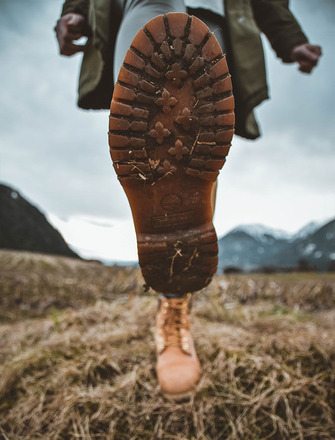
You can kick depression’s butt!
Whether you’re returning from teaching abroad in Spain or just wrapped up a year of study abroad in China , chances are things are going to feel different when you return home. Accepting your new reality is part of getting over post-abroad depression, but there are other things you can do to help make the transition a bit easier.
1. Learn about reverse culture shock
Pull out those study abroad materials or do some googling and read up on how to overcome reverse culture shock . It’ll still take some time to re-acclimate to your home country, but understanding that post-trip depression is normal can go a long way toward helping you get past it. Just like you got past your initial culture shock in your host country, you’ll also eventually hit your stride now that you’ve returned home.
2. Practice what you learned
Just because you’re no longer surrounded by Portuguese or Arabic on a daily basis doesn’t mean you can’t keep up your newfound skills! There are many ways to practice the language you learned while abroad, from reading local news online to watching movies in your target language. In bigger cities and college towns, there are conversation circles or cultural centers that host events where you can practice your language and get a soothing dose of your host culture, too.
3. Give back
Look for volunteer opportunities while you get your bearings in your home country. It’s a proven fact that helping others makes you feel good too, and getting involved in your local community will help you regain a sense of connection to the city and people you interact with on a daily basis. Who knows? Maybe you’ll enjoy it so much that you decide to take it on the road and volunteer abroad next!
4. Go explore your backyard
By now you should be a pro at discovering cool new places, right? After all, you probably spent your time abroad seeking out new neighborhoods, taking day trips to nearby cities, and learning all about what makes your host country special. Instead of lamenting the fact that you’re no longer abroad, do the same thing at home. Take a day trip to discover a new small town, go on a hike to someplace new, or find a cultural activity to participate in. There’s probably a lot that you’ve never thought to discover about your home country, so get started now!
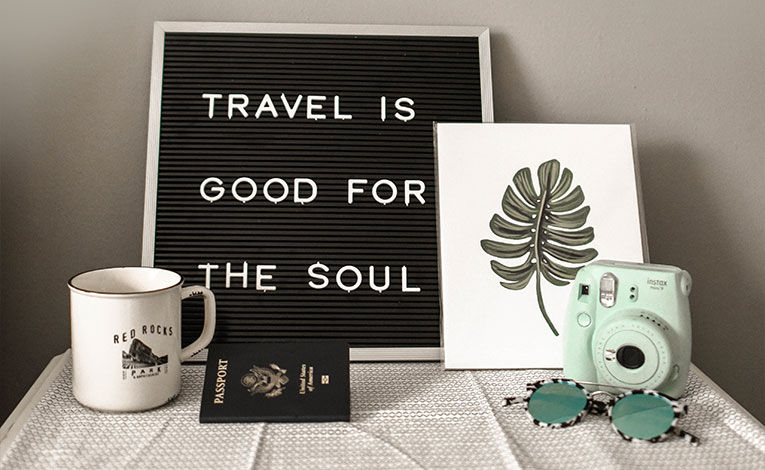
Encourage the explorer in yourself!
5. Connect with others
One of the best ways to get over post abroad depression is to be around other people. Isolating yourself can amplify your post travel blues, so get out there and reconnect with your old friends. Check out a new restaurant that’s opened since you were away, go for a walk, or participate in a shared hobby. If most of your friends have moved away since you were abroad, find new ones! Look for community events, meetups, or cultural activities where you can find people who share your interests.
6. Plan another trip
One fail-proof way to get over depression after trips is to plan another trip. Whether you have the time and funds to take a two-week break on a sandy beach somewhere or you can only swing a weekend in the next state over, planning for some time away allows you to take a quick break physically and mentally. While not all problems can be solved by a road trip or hopping on an airplane, sometimes getting away can give you some much-needed perspective on your current situation. If money is an issue, check out short-term volunteering trips that are affordable and let you give back to the community.
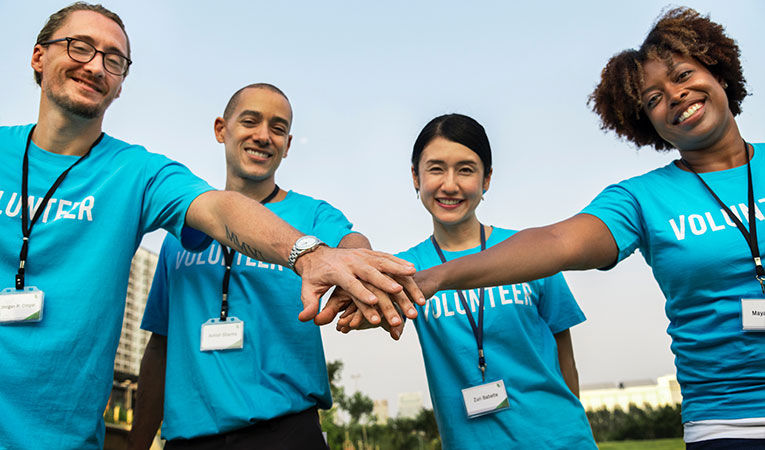
Plus, volunteering can make you feel all warm and fuzzy inside!
7. Try something new
Instead of constantly refreshing your browser hoping airfares to your host country have dropped, consider finding a new hobby. You probably got really good at getting out of your comfort zone and trying new things when you were abroad, so use those skills to get psyched about something in your home country. Learn how to make that pastry your host mom always made for you, join a community sports league, or find a volunteering gig. Not only will you momentarily be distracted from how much you miss being abroad, you’ll also add some new skills to your repertoire. You might even discover a lifelong passion!
8. Practice gratitude
It can be hard to feel grateful when you’re bummed and missing your host country, but take the time to practice gratitude for the experiences you’ve had. Not everyone is lucky enough to spend time living in a different culture, learning a new language, and making friends from around the world. Your time abroad was exciting and enlightening, but at times it was probably confusing and really dang hard, too. Be thankful for the life skills you learned while you were abroad.
Additional resources when you feel depression after a trip abroad
If you’ve tried the above suggestions and you still don’t feel any better, even after signing up for a knitting class, going on a camping trip, and getting dinner with friends, you may need to pull in some additional resources.
Talking about your post trip depression with a therapist or counselor can help you pinpoint why exactly you’re feeling down and find strategies to make things better. If you’re a student, you can access mental health resources through your school’s student counseling center. For those who aren’t in school, there are also ways to find therapists in your community .
During your time abroad, you learned a lot about yourself and how to be an independent, strong, and resilient individual. None of those skills have disappeared, and you can still use them to get through this tough phase in your life .
Don’t let post abroad depression get the best of you
Post-travel depression can affect anyone, and it’s important to recognize when the post travel blues might be something more serious. In many cases, those who return from time abroad are able to reintegrate into their lives within a matter of months, but sometimes it can take some dedicated work to feel normal again. Living abroad is an intense, challenging, and enlightening experience, and it’s bound to change you in more ways than you realize.
The good news is that this time spent abroad isn’t an ending, but rather the beginning of a new life of travel. Now that you’ve seen another part of the world, going out there and doing it again doesn’t feel as intimidating. It’s 100% possible to continue living an inspired life after spending time abroad , and chances are, the best is still yet to come.
Leave a Review of Your Travel Program & Help Future Travelers

Explore Programs on GoAbroad.com
Related Articles

By Rebekah Glebe | 4 days ago
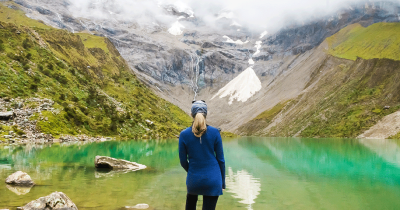
By Elizabeth Gorga | 5 days ago

By Julie Ball | 5 days ago

By Julia Zaremba | 6 days ago
Popular Searches
Study abroad programs in italy, study abroad programs in spain, marine biology study abroad programs, study environmental studies abroad, fall study abroad 2024, spring study abroad programs, recommended programs.

2566 reviews
International TEFL Academy

1675 reviews
International Volunteer HQ [IVHQ]

1898 reviews
MAXIMO NIVEL

555 reviews
Intern Abroad HQ
For Travelers
Travel resources, for partners.

© Copyright 1998 - 2024 GoAbroad.com ®
- Study Abroad
- Volunteer Abroad
- Intern Abroad
- Teach Abroad
- TEFL Courses
- Degrees Abroad
- High School Abroad
- Language Schools
- Adventure Travel
- Jobs Abroad
- Online Study Abroad
- Online Volunteer Programs
- Online Internships
- Online Language Courses
- Online Teaching Jobs
- Online Jobs
- Online TEFL Courses
- Online Degree Programs
Thanks for visiting! GoodRx is not available outside of the United States. If you are trying to access this site from the United States and believe you have received this message in error, please reach out to [email protected] and let us know.
Post-Vacation Depression: Coping Strategies and Understanding Its Causes
There’s nothing like a great vacation—until, of course, it’s over. For many people, the mental toll of going back to work or school after vacation can be brutal. If this sounds like you, good news: you’re not alone, and there are coping strategies that can help you smoothly return to your daily routine.
Here, we’ll unpack exactly what causes “post-vacation depression” and how best to treat it.
What is post-vacation depression?
“Post-vacation depression” or “post-vacation blues” is the dread of returning to school, work, or any “normal” responsibilities after a great vacation. It includes any accompanying feelings of anxiety, sadness, or lack of motivation.
Post-vacation depression is fairly common. In fact, research finds that while being on vacation can greatly increase feelings of happiness and well-being, it's common for those feelings not to last when we return to our everyday lives.
Looking for professional help? See if Talkiatry is right for you
Is post-vacation depression a legitimate medical condition .
Post-vacation depression is not a medical condition—although if you’re going through it, that doesn’t mean it doesn’t have a negative impact on your well-being. The good news is, the symptoms of post-vacation depression have a clear cause—and are temporary.
It’s important to emphasize that "post-vacation depression” is not the same as clinical depression (major depressive disorder)—a common but serious mental health condition characterized by persistent feelings of sadness and hopelessness. Unlike post-vacation depression, true clinical depression has symptoms that persist for at least 2 weeks and are severe enough to interfere with everyday life.
Other symptoms of clinical depression include:
- Loss of interest in hobbies or activities you once enjoyed
- Sleep problems, including insomnia or sleeping too much
- Trouble concentrating
- Anxiety, restlessness, or irritability
- Appetite and/or weight changes
- Feelings of worthlessness or guilt
- Persistent thoughts of suicide or death
If you suspect you have something more than the post-vacation blues or post-vacation depression, seek help from a mental health professional.
What causes post-vacation depression?
Post-vacation depression may be caused by one or more of the following:
- A tightly-scheduled vacation without enough time to unwind or disconnect
- Too rapid a transition back to everyday life
- Overall dissatisfaction with your “everyday life” including relationships with loved ones
- A very stressful job or school situation that feels difficult to return to ‘real life’
- Lack of self-care in your regular routine; poor work-life balance
- Underlying mental health conditions
How do I prevent post-vacation depression? 4 tips from our psychiatrists
If you experience the post-vacation blues know that it’s normal to be disappointed when an especially pleasurable experience ends. However, that doesn’t make it easy to cpe. The following tips from our psychiatrists about post-vacation habits can help you get a handle on post-vacation depression and improve your well-being.
1. Confront the major stressors in your life
Sometimes, all it takes is some time away to help you recognize unresolved conflicts at work or home. If coming back from vacation to regular life feels especially tough because of a bad relationship with a colleague, maybe it’s time to discuss this with your boss. Or, if you simply can’t bear the thought of returning to an apartment you hate, it may be time to consider a new living situation.
Feeling overwhelmed by work stress? Check out: Combatting Anxiety at Work: 8 Tips from our Psychiatrists
Have other worries weighing you down? Check out: 5 Tips on How to Stop Worrying About Everything
2. Plan activities you enjoy
Just because your vacation is over, doesn’t mean you have to stop having fun. In fact, it’s a great idea to plan a few activities you especially love for soon after your vacation—say, going out to dinner with friends, family members, or loved ones you haven’t seen in a while, getting a massage, seeing a movie you’ve been wanting to see, or blocking off a few hours for some physical activity, like a hike. Adding some fun in your normal routine can do wonders for your well-being and having something to look forward to can help take the sting out of the end of your vacation.
3. Get back to a regular sleep schedule
Vacations often represent a disruption to our normal sleep schedule (especially if jet lag is involved). For some people, it’s a time to sleep more, while others sleep less in favor of doing activities and staying up late. Regardless of how you choose to sleep on vacation, try to ensure you get back to a regular sleep schedule as soon as possible after your vacation ends. Research shows that sleep is intricately linked to mental health, and getting consistent, regular sleep is one key to preventing mood dysregulation.
4. Plan your next vacation
When it comes to ending the post-vacation blues, it may be as simple as getting your next trip on the books. Research shows that while the enjoyment you get from a vacation might not last beyond the trip itself, it can start weeks, or even months before your getaway begins. So, start planning that trip (better yet get together with friends or loved ones to plan it)—even if it’s a while away, it should help ease the sadness you’re feeling now and improve your mental health.
When to seek help
Feeling disappointed, sad, or even anxious when your vacation is over can be a normal part of life. The good news is, the feelings should resolve with time—and potentially resolve a little faster if you adopt some of the tips suggested above.
If you just can’t seem to shake your post-vacation depression, however—particularly if symptoms persist for longer than two weeks and start to interfere with your daily life—it may be a sign of a more serious underlying condition. A mental health professional, like a psychiatrist, licensed therapist, or licensed clinical social worker (LCSW) can help you sort through your feelings and identify if there’s a deeper issue at play.
With Talkiatry , you can see a psychiatrist from the comfort of your home, and you can schedule your first appointment in a matter of days. To get started, take our free online assessment , to see if Talkiatry is right for you and get matched with a psychiatrist that’s right for you .
About Talkiatry
Talkiatry is a national psychiatry practice that provides in-network, virtual care. Co-founded by a patient and a triple-board-certified psychiatrist, Talkiatry has over 300 doctors, 60 insurance partners, and first visits available in days. We treat patients with anxiety, depression, trauma, ADHD, and more. Get started with a short online assessment.
The information in this article is for informational and educational purposes only and should never be substituted for medical advice, diagnoses, or treatment. If you or someone you know may be in danger, call 911 or the National Suicide and Crisis Lifeline at 988 right away.
Applied Research in Quality of Life | Vacationers Happier, but Most not Happier After a Holiday
Division of Sleep Medicine Harvard Medical School | Why Sleep Matters: Benefits of Sleep
Journal of Happiness Studies | Vacation (after-) effects on employee health and well-being, and the role of vacation activities, experiences and sleep
Mayo Clinic | Depression (major depressive disorder)
Dr. Brenda Y. Camacho holds the position of Staff Psychiatrist at Talkiatry. She is board-certified in Adult Psychiatry. She has been practicing for over 25 years. While having treated a wide range of adult patients, Dr. Camacho’s primary focus is treating adult outpatients with mood or psychotic disorders. Her practice focuses on medication management. Typically, she offers this in conjunction with supportive or insight-oriented therapy in 30-minute follow-up visits. On occasion, Dr. Camacho will believe additional therapy is also needed and asks that you bring a therapist into your care team to provide the best outcome. Dr. Camacho completed her undergraduate studies at Tufts University. She received her medical degree from Temple University School of Medicine in Philadelphia, PA and then continued with Temple for her residency in adult psychiatry. After completing training, Dr. Camacho worked at Cooper Hospital in Camden NJ as Associate Director of Consultation/Liaison Service and Psychiatry Residency Training and Co-Director of the Neuropsychiatry Clinic. She then began working exclusively in outpatient settings, joined NewPoint Behavioral Health Care, and served as Medical Director before and after their merge with Acenda Integrated Health.
Lexapro vs Wellbutrin: Which more effective?
What to know about maois—including a comprehensive list, why am i so emotional, get virtual care from psychiatrists that take insurance, mental health is personal. so is our approach to psychiatry..
The Talkiatry branded Psychiatry practice is independently owned and operated by a licensed Psychiatrist. For more information about the relationship click here .
The Open Payments database is a federal tool used to search payments made by drug and device companies to physicians and teaching hospitals. It can be found at openpaymentsdata.cms.gov .
©2022 Talkiatry Management Services, LLC. All Rights Reserved.
Manage your mental health
Need help? Call us at (833) 966-4233
Why am I so sad after a vacation? How to deal with post-vacation depression
Vacations are a wonderful and exciting part of life. They can expose you to new adventures and experiences that can change your life as you know it, or give you the relaxation and time off you need to be the best version of yourself.
However, returning to normal life after vacation isn’t always an easy process. Coming back from vacation can cause stress, overwhelm, and unhappiness. In fact, this is so common that there is a term for this phenomenon: post-vacation depression.

Why Do I Feel Weird After Coming Back from Vacation? Why Am I Crying After a Trip?
There are many reasons someone might feel strange or sad after coming back from a trip. Coming back from vacations, especially longer ones, can feel like a big adjustment. After all, the look and feel of your daily life changes dramatically for a relatively long period of time. When it ends and you’re expected to return to your normal routine and responsibilities, it’s easy to get into a funk.
Sometimes, a trip is so wonderful and stimulating that returning to your normal life, with all its quirks and downsides, can be a bit of a letdown. It can be difficult to feel eager or happy about returning to work or school, doing things you don’t necessarily enjoy, when the past few days or weeks were filled with relaxation and excitement.
With other trips, perhaps you were really looking forward to them, and your high expectations ended up being met with disappointment. Something went wrong, or maybe the experience just wasn’t what you wanted it to be.
This sensation is referred to as post-vacation depression or post-travel blues, and is often caused by work stress or burnout, dissatisfaction with life, or a lack of relaxation during a vacation.
How you feel may not even be related to the vacation itself, but rather something else going on in your life. When we don’t know exactly what we’re feeling or why we’re feeling it, it’s helpful to have ways to figure it out, such as:
- Thought recording (i.e. journaling): Identify events that triggered distress, identify thoughts that were elicited automatically, identify evidence to support or counter the thought.
- Mindfulness : Be aware of what’s going on within and around you without judging.
- Education : Learn about the different types of feelings in order to better identify the ones you are experiencing
- Behavior activation skills: Find out what activities, people, places, or things make you feel the most satisfying or make you feel the most like yourself, then work to integrate more of them into your schedule.
What Is Post-Trip Depression?
Post-trip depression refers to a type of depression with a wide range of negative feelings that affects one’s functioning after going on vacation. Common symptoms include:
- Frustration/irritability
- Inability to focus
- Lack of motivation
- Sleep disruption
Though depression after vacation is certainly a real phenomenon , it is different from depression in that it is not recognized as an official diagnosis in the Diagnostic and Statistical Manual of Mental Disorders, Fifth Edition (DSM-5).
Post-trip depression is also a short-term condition. This means that, if your symptoms continue to persist, it may be worth exploring if you have a depressive disorder . Factors to consider when your post-trip depression persists are:
- Symptoms lasting for two or more weeks
- Sustained changes in your mood and emotions
- Sustained changes in cognition, such as your awareness/perception, memory, reasoning, judging, or problem-solving abilities
- Dissociating from society
- iImpediment of any daily personal, relational, academic, or social functioning
Want to talk to a depression therapist?
Start working with one of our top-rated providers. We have availability now and accept most major insurances.
How Long Does Post-Vacation Syndrome Last?
Post-vacation depression usually lasts a few days, but some extreme cases last as long as two to three weeks. The duration of the condition can depend on a number of factors, such as:
- What specific symptoms is the individual experiencing
- How emotionally vulnerable a person is to negative feelings (either in general or at that moment in time)
- Overall life satisfaction (i.e. happiness with home, work, school, family, etc.)
- Amount of stress occurring in regular life (resistance to return to regular life)
- Events that occurred while on vacation
If your symptoms continue to occur for more than two weeks, consider talking to a mental health professional, it’s possible you may be suffering from standard depression . This is diagnosable and has effective treatment approaches that can be administered by a therapist or psychiatric professional.
How Long Does It Take to Feel Normal After a Trip?
The length of time it takes for you to adjust to your “normal” after a vacation will likely depend on many factors. Your satisfaction with your life before your trip and the happiness or disappointment caused by the trip itself are two influential factors. Adjusting will take time, though there are ways to assess why it’s taking a while for you to adjust or help yourself get back to regular functioning. Some examples include:
- Ensure returning to “normal” includes healthy habits and behavior activation (uplifting activities) rather than just typical or conforming behaviors
- Think about your situation before the trip: Were you happy, or did this trip highlight some unhappiness in your normal life?
- Focus on a good self-care routine
- Establish firm boundaries and enforce them when they’re tested
Often, time is the main factor in adjusting from one situation to another, but these practices can help make the transition that much easier.
Is Post-Vacation Anxiety a Thing?
Post-vacation anxiety is not a condition recognized in the DSM-5. However, returning to the responsibilities and stress of normal life after being free on a vacation can absolutely cause a certain amount of anxiety . When we are in our regular flow of life, our responsibilities are always there, so the stress they cause may not feel overwhelming, since we are used to the same continued amount of pressure from them.
The relief of freedom from responsibility that is often experienced on vacation can then make returning to them much more overwhelming, with the full weight of them returning all at once. Many may even come back from vacation with more work to do than when they left, due to work or school demands.
If the anxiety continues to affect your life well after the trip ends, it may be wise to seek advice from a mental health professional, as it may be a sign of chronic stress or an anxiety disorder . They will be able to inform you about your condition and guide you through appropriate treatments.
How Do I Stop Post-Travel Blues?
Over time, symptoms of post-travel blues will likely fade, but if you would like to help cushion the blow or need ways to help yourself cope, there are many practices you can do. Consider implementing the following practices to help you with your post-vacation blues:
- Incorporate adjustment time into vacation time to help ease you back into your routine
- Minimize the accumulation of demands prior to travel so that there aren’t too many tasks waiting when you return
- Treat feelings as your body communicating to you what you need more of. For example, if you feel lonely upon return, consider focusing on increasing time spent with those close to you outside of travel
- Consider the source of your negative feelings (Did you spend too much money? Do you regret things that happened on the trip?) and take steps to course correct.
- Be mindful of where you put your focus — is what you’re focusing on eliciting undesirable feelings?
- Focus on eating well, physical activity, rest, and other good self-care activities
- Limit the stressors in your life
Though post-travel depression is no fun, remember that this condition is temporary—you have it in you to return to your normal life or make the necessary changes to help ease your sadness and stress. Whether these adjustments look like personal lifestyle changes or seeking assistance from a mental health professional, there are many effective ways to treat post-vacation depression.
Published Jun 12, 2023
Our clinical and medical experts , ranging from licensed therapists and counselors to psychiatric nurse practitioners, author our content, in partnership with our editorial team. In addition, we only use authoritative, trusted, and current sources. This ensures we provide valuable resources to our readers. Read our editorial policy for more information.
Thriveworks was established in 2008, with the ultimate goal of helping people live happy and successful lives. We are clinician-founded and clinician-led. In addition to providing exceptional clinical care and customer service, we accomplish our mission by offering important information about mental health and self-improvement.
We are dedicated to providing you with valuable resources that educate and empower you to live better. First, our content is authored by the experts — our editorial team co-writes our content with mental health professionals at Thriveworks, including therapists, psychiatric nurse practitioners, and more.
We also enforce a tiered review process in which at least three individuals — two or more being licensed clinical experts — review, edit, and approve each piece of content before it is published. Finally, we frequently update old content to reflect the most up-to-date information.

Sports fan depression is real: Did your team lose last night?

What is high-functioning depression? Is it different from depression?

“Am I depressed or lazy?” Breaking down the differences and addressing the stigma
Want to talk to a depression therapist? We have over 2,000 providers across the US ready to help you in person or online.
- Clinical writer
- Editorial writer
- Clinical reviewer

Laura Harris, LCMHC
Laura Harris is a Licensed Clinical Mental Health Counselor (LCMHC). She specializes in anger, anxiety, depression, stress management, coping strategies development, and problem-solving skills.

Alexandra Cromer, LPC
Alexandra “Alex” Cromer is a Licensed Professional Counselor (LPC) who has 4 years of experience partnering with adults, families, adolescents, and couples seeking help with depression, anxiety, eating disorders, and trauma-related disorders.

Hannah DeWitt
Hannah is a Junior Copywriter at Thriveworks. She received her bachelor’s degree in English: Creative Writing with a minor in Spanish from Seattle Pacific University. Previously, Hannah has worked in copywriting positions in the car insurance and trucking sectors doing blog-style and journalistic writing and editing.
Discover more
Struggling with depression?
Thriveworks can help..
Browse top-rated therapists near you, and find one who meets your needs. We accept most insurances, and offer weekend and evening sessions.
Rated 4.4 from over 15,090 Google reviews

The information on this page is not intended to replace assistance, diagnosis, or treatment from a clinical or medical professional. Readers are urged to seek professional help if they are struggling with a mental health condition or another health concern.
If you’re in a crisis, do not use this site. Please call the Suicide & Crisis Lifeline at 988 or use these resources to get immediate help.
- EN - English
- PT - Portuguese
- ES - Spanish
- How it works
- Become a Host
- Download the app
Top Destinations
- United States
- United Kingdom
What type of experience are you looking for?
- Non-Profit School
- Permaculture project
- Eco Village
- Holistic Center
- Guest House
- How Worldpackers works

Learn from the most experienced travelers of the community
Traveling with worldpackers, planning and budgeting for travel, make a living while traveling as a lifestyle, travel with worldpackers.
- Using Worldpackers
- Work exchange
- Social impact
- Plan your trip
- Women traveling
- Budget travel
- Solo travel
- Language learning
- Travel tips
- Get inspired
- Digital nomads
- Travel jobs
- Personal development
- Responsible travel
- Connect with nature
Top destinations
- South America
- Central America
- North America
- More destinations
- WP Life WP Life
- Exclusive discounts Discounts
Post-vacation depression: what is it and how to deal with it
Post-vacation depression is real. It can start creeping in at the end of your trip and annoyingly stick around once you get home. We'll talk about what it is, I'll share my experience with it, and give some tips on how to tackle it.
Kate Maskedtravelsx
Aug 02, 2023
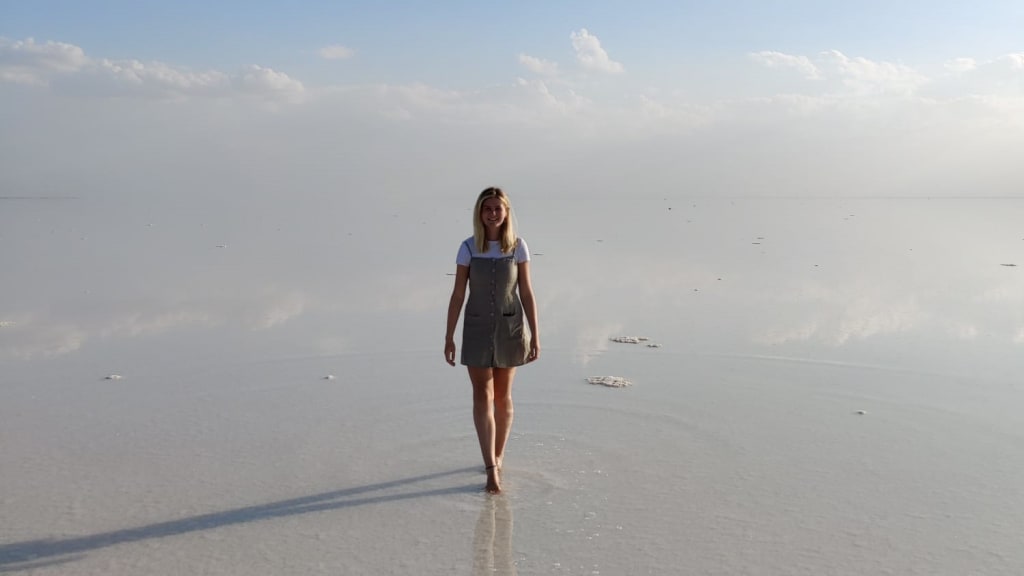
What is post-vacation depression?
Post-vacation depression, also known as holiday blues, is that dread, sadness or anxiety that you can start to feel at the end of your trip or when you get home.
Returning home, there can be a lack of motivation to slip back into your daily routine . Wishing you were back scaling mountains, eating tapas, relaxing on beaches, or whatever it was that you were doing.
That feeling can be debilitating . Sometimes it’s all you can think about, and it can get you down . The transition back to normal life can be difficult enough, but throw in some unwanted negative emotions and it’s even harder.
It can manifest in lots of different ways: fatigue, lack of focus, isolation, anxiety, irritability or mild insomnia . Everyone experiences it differently!
Is post-vacation depression real?
Without a doubt, post-vacation depression is real. Ask most travellers what they’ve felt like when they’ve returned home from a holiday or a long trip, and they’re likely to describe feelings along the lines of post-vacation depression.
It's a real thing that we should all be talking about and supporting each other through because it’s not easy!
My experience with holiday blues
I’ve experienced post-vacation depression a few times. It happened after my first big trip, after weekend trips to Europe and right now as I've just got back from 2 years of travelling.
When travel runs through your blood and is what you love doing, it’s hard not to experience it.
But there are ways to cope with it , and that’s something that I’ve got better at doing as time has gone on.
Returning from my first trip
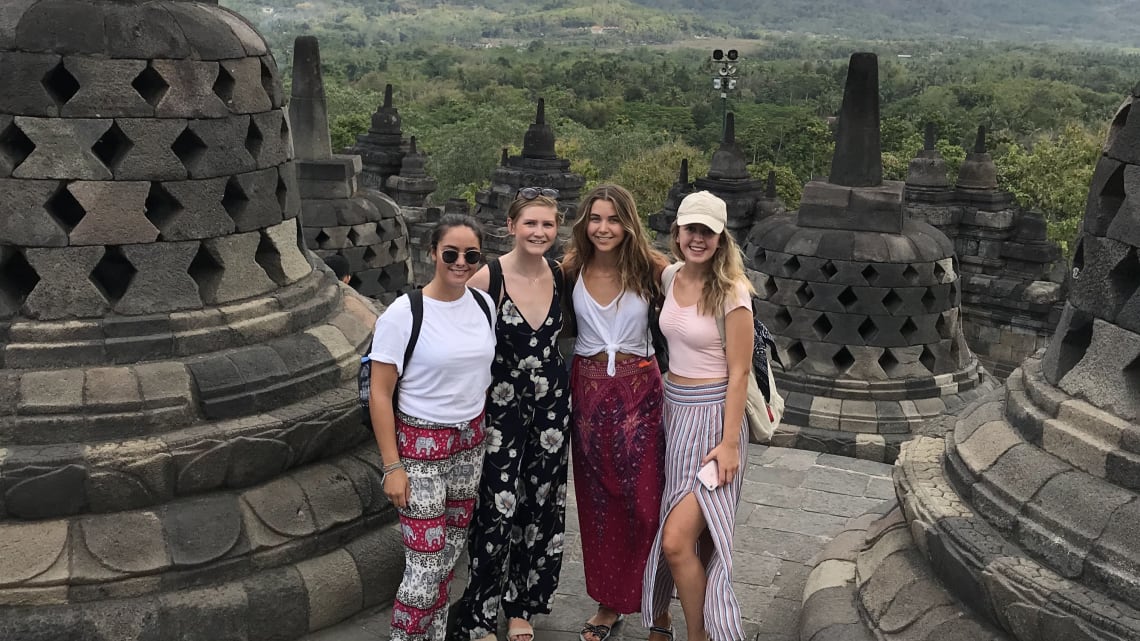
At the age of 18, I went on my first big trip! I packed my backpack and headed to Indonesia for a month with my three best friends. This was my first time travelling, and let’s just say it was love at first sight .
Once you start travelling, you quickly realise that there is so much out there to explore . That the world is a beautiful place filled with adventures, fascinating cultures and epic landscapes . I was hooked!
The month flew by, and I didn’t want to come home . Why would I give up this life of endless fun and learning, for a mundane life in a corporate job? The answer was that I shouldn’t, but rational, societal pressures and a good job waiting for me pulled me back home.
And then the blues hit! Badly! My head was a constant flurry of questions asking why I was here when I could be travelling. Had I made the right decision to come home? I even ended up crying in a nightclub, confused about what decision I should make. Thankfully I now know how to deal with these emotions better than 18-year-old Kate.
I started working as a Management Consultant, but the entire time it felt like something was missing . I would still go on trips, but it wasn’t the same as actually travelling, and every time I came back, the sadness and yearning to travel would get bigger .
These feelings continued until I finally decided to take a career break . I am extremely lucky that my company allows us to take up to 3 years of unpaid leave during your time with them. I knew that if I didn't get the travel bug out of my system then I wouldn't be happy . Although now I've discovered that no length of time is enough to satisfy this hungry bug
I decided that with the curve ball of COVID, 2 years would be a good amount of time.
After my 2-year career break
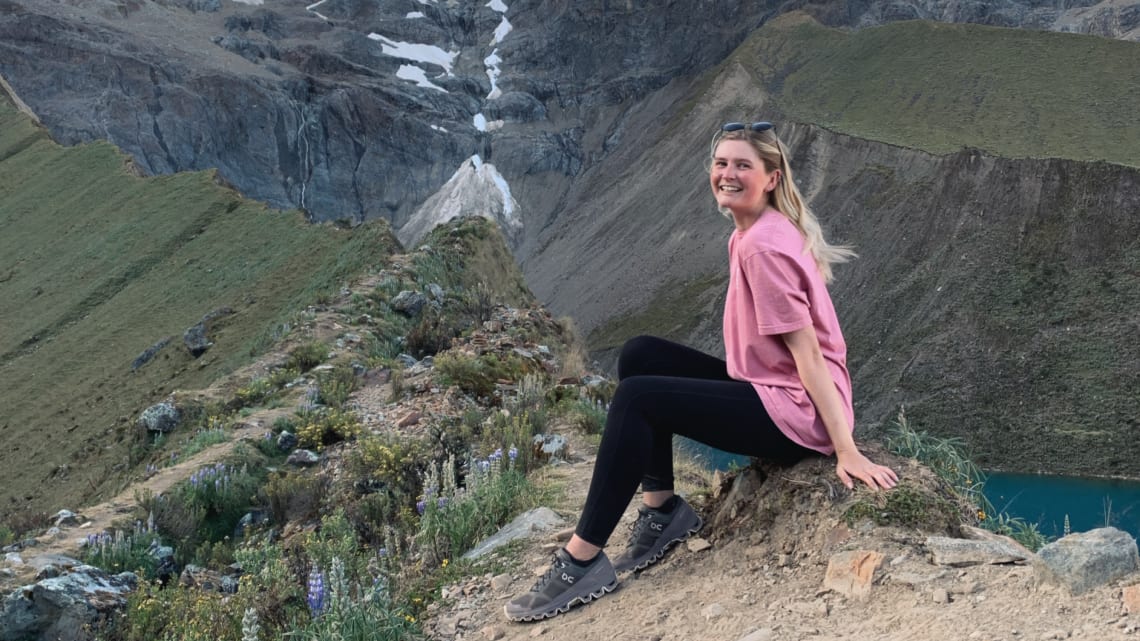
I only recently got back from my 2-year career break travelling the world ! I spent a year in Latin America, both of my summers in Europe, and dipped my toe in Africa and Asia.
The trip was more than just travelling, it was my way of life ! After that length of time, you get used to the ultimate freedom and lack of serious responsibilities . I was the only person who could decide where I wanted to be, when and with who. I was in charge of where I worked , whether it be in a beach club, a cafe or on a bus in Morocco.
Transitioning back to a ‘normal life’ wasn't easy , it was a complete lifestyle and mindset change.
Coming home, I was prepared for the holiday blues to hit me hard . I did spend the entirety of my last flight listening to songs that brought back memories from my trip and staring out of the window crying. But when I landed those blues didn’t overwhelm me like I had expected them to.
Something had changed
My perspective had changed. Instead of being sad it was over, I am incredibly grateful for the adventure I have been on and for the people I have met. What I had expected to be tears are often replaced by reminiscent smiles whenever I think of my travels.
Don't get me wrong, I haven't managed to escape the blues completely . They do still come in waves. I’ll be sitting watching TV and thinking that I could be eating tacos in Mexico right now, or camping on top of a mountain, but I’ve got better at dealing with those thoughts and emotions.
Here are some of the ways that I’ve dealt with post-vacation depression:
How to deal with post-vacation depression
In my opinion, I don’t think you can avoid post-vacation depression entirely . But you can learn and implement ways to reduce the severity of it, which in turn tends to improve your daily life at home. It's a win/win situation!
1. Make your life at home an adventure
Going home doesn’t mean that you have to go back to a boring life . Sure, you might have to work 9 to 5, but there’s plenty of time outside this to add adventures to your life and continue pursuing interests that you picked up travelling.
Did you love the food in a particular country? Try cooking a new recipe from that place every week. Did you go to Latin America and fall in love with salsa? (I did). Join a salsa class or dance the night away at salsa parties.
You can still have that taste of travelling at home. It just might take a bit more searching to find it and build it into your daily life.
Making a bucket list of things you'd like to do around your area and in your own country can help to keep adventure in your daily life. Some things to add to the list might be: completing a hiking trail near you, trying a new restaurant every week or volunteering for a local charity. Get creative!
2. Have something to look forward to
Keep the excitement coming! Having another holiday booked or an upcoming adventure helps to settle those holiday blues. Doing this means that you have something to get excited about and plan for.
It doesn’t always have to be big things either. It can be as simple as a weekend with your friends or going to the theatre.
Three things that I picked up whilst travelling were yoga, salsa and Spanish. I’m really keen to continue practising those skills, and I look forward to each time I get to do them. Whether it’s doing yoga in the morning or going to my salsa class on a Wednesday, every day I have something in my life now that takes me back to my travels.
I also like to book weekend trips to keep me going until my next big adventure. I can start planning the trip, booking my accommodation and building that excitement.
3. Try and keep in contact with friends you’ve made
This one is particularly important if you went solo travelling. One of the worst parts of solo travelling is that you experience these incredible things, but have no one to reminisce about them with when you get home.
Staying in contact with the people that you went on these adventures with helps to keep the flame and excitement alive. Whether it’s online or in real life, getting to chat with people who truly understand what you’ve been through massively helps with tackling the holiday blues . You still feel connected and understood, something that can be hard if your community at home has never been travelling.
I’m extremely lucky that I live in London and so do a lot of people that I met on my travels. My ‘travel’ friends have now become the friends that I hang out with at home.
One way I made life-long friends was by volunteering. I spent 5 weeks teaching English in Colombia . That was almost a year ago and I still talk to the people I met there . We often reminisce about the fun we had and the impact we had on our students.
4. Apply a different perspective to your memories
It’s easy to think about all the things you're missing out on when you return home from travelling. Your heart yearns for what you had before.
Instead of being sad about not having these things right now, be grateful that you got the chance to experience them . Practising gratitude for your time travelling and for your life now is extremely useful for telling those holiday blues to go away .
Focus on the things you’re grateful for at home — your comfy bed, seeing friends and family again, not living out of a backpack, etc. Try writing a list and you’ll realise there are plenty of things to be grateful for.
5. Embrace your feelings and emotions (yes, even the bad ones)
Feeling sad, depressed or anxious about returning home is a common thing. Lots of people go through it and it’s important to accept what you're feeling . Trying to bury and ignore them will get you nowhere.
Let yourself feel the emotions and try to talk about them . If you’ve made friends whilst travelling, reach out to them. They’re probably feeling the exact same way as you and they'll be able to relate.
The other day I sat and looked through all of my photos and videos from my 2-year trip. I cried and that’s okay! I got sucked into the black hole of wishing that was still my life, but those feelings went away by the next day and after I'd chatted with some friends.
Bonus tip: immerse yourself in what you miss
When I get back from somewhere, I love to still immerse myself in that culture. That might mean creating a playlist with all my favourite songs from that country or watching movies and series from that place.
Watching travel vlogs on Youtube can also be a good way to transport yourself back there, and experience it from someone else's perspective.
Missing the food? Find a restaurant near you that serves the traditional food that you miss. Or get creative and cook it yourself! There are plenty of recipe videos on the internet.
Key things to remember about post-vacation depression
Remember that it probably wasn’t the last holiday or travelling that you’re going to experience . Start looking forward to what’s coming next, and in the meantime look back with gratitude at the incredible memories that you have created!
Allow yourself to feel those emotions , and reach out to people who will give you the support you need.
That’s where social media can be a beautiful place to connect with other like-minded people and travellers. Consider joining Facebook groups, connecting with travel accounts on Instagram and becoming part of the Worldpackers community .
You can follow Worldpackers on social media to keep up with all things travel-related and connect with other travellers: we are on Instagram , Tiktok and YouTube !
Join the community!
Create a free Worldpackers account to discover volunteer experiences perfect for you and get access to exclusive travel discounts!
Kate Woodley
Maskedtravelsx
Kate is a Management Consultant (and now writer) who decided to take a 2 year career break and travel the world. She shares her travels around the world and shows people the fun of solo travelling!
Be part of the Worldpackers Community
Already have an account, are you a host, leave your comment here.
Write here your questions and greetings to the author
Dec 28, 2022
Jan 19, 2023
May 15, 2023
Dec 30, 2022
💗💗💗🙊🙊🙊🙊💗💗💘💘💘💘
Jan 03, 2023
Apr 23, 2023
May 08, 2023
More about this topic

13 Bucket list adventure ideas around the world
How to travel with autism in an independent and safe way
6 reasons why now is the best time to plan for big travel goals
How do Worldpackers trips work?
As a member, you can contact as many hosts and travel safely as many times as you want.
Choose your plan to travel with Worldpackers as many times as you like.
Complete your profile, watch the video lessons in the Academy, and earn certificates to stand out to hosts.
Apply to as many positions as you like, and get in contact with our verified hosts.
If a host thinks you’re a good fit for their position, they’ll pre-approve you.
Get your documents and tickets ready for your volunteer trip.
Confirm your trip to enjoy all of the safety of Worldpackers.
Have a transformative experience and make a positive impact on the world.
If anything doesn’t go as planned with a host, count on the WP Safeguard and our highly responsive support team!
After volunteering, you and your host exchange reviews.
With positive reviews, you’ll stand out to hosts and get even more benefits.
Our Cookie Policy
We use cookies on this site to enhance your user experience. By continuing to use our website you agree to our Cookie Policy.
How to Deal with Post-Vacation Blues and Be Happy Again

Traveling the world for a short or long period is always incredible. None of the experiences you get home can’t be compared to those you get abroad, as every country has its own culture and traditions. Therefore, you experience wonderful things that you can’t at home. And no matter how long you travel, going back is always both exciting and a bit sad.
Travelers who get back home after a couple of weeks of travel can feel sad after vacation they just spent on a sunny beach, in a busy but adventurous city, hiking and trekking in various gorgeous places, or visiting family and friends. But travelers who get back home after a year or so might even experience the so-called post-vacation depression .
End of vacation blues always hit travelers since the trip is coming to an end, and the “normal” life is all around. It usually occurs in the last week or the last several days of a trip. And while on the last run of completing the things-to-do-during-the-trip list, this feeling will dissipate for a couple of weeks after you arrive home.
Travelers who used to discover the world, explore diverse locations, meet people, and pursue their goals freely, now have to get back to the point they were left when their journey started. And that is not always easy. No wonder post-travel depression is an expected occurrence.
So, while you may be one of them, you are probably seeking answers. You may have a lot of questions now as life has changed for you, but not for those who surround you at home. That’s why we’ll answer some questions that may appear in your mind, and after that, we’ll provide you with some tips to overcome your after trip depression.
What Is Post-Travel Depression?
It is a feeling that is usually experienced by travelers who get back to the life they used to live before they went on traveling. Not every traveler experience it, but the majority are having it due to the high transformative feature of travel. No matter how stubborn is a person to new conditions, he might get changed after a trip. People who travel around the world and feel on their skin diverse life situations, occurrences, events, discover traditions, culture through interacting closely with the locals are more likely to get depressed after travel.
Why Do I Experience Depression After Traveling?
As said, travel is highly transformative. People’s minds and life aspects get changed as they get to perceive the world differently when they see, feel, think about, and experience on their skin things that can’t be experienced while living in a constant ambiance. By traveling, you discover a brand new world, and if you carry back home the knowledge and experience you got from your trip, you will find out that it doesn’t fit in the reality you just got back to.
How to Actually Overcome Depression After Vacation?
As depression can seriously impact mental health, overcoming it is vital for your well-being and, consequently, for the quality of your life. Keeping a positive mindset is the key factor, and as you are already seeking an answer, you are just a few steps from being happy and motivated again. After all, knocking over post-trip depression is just a matter of time and is on the length of a great piece of advice. Read on to find out several tips on the topic.
1. Keep You Schedule Busy on the Last Days of Your Trip
To capture every positive memory possible, get your schedule busy on the last days of your stay in a foreign country. Go to a masterclass and learn something new. For instance, attend a photography workshop or a cooking lesson. Visit the places you haven’t been to yet and capture gorgeous pictures of them. Have one last dinner in a location that you know will remind you about your trip years ahead.
Inhale every moment of your trip and keep them in your mind and heart. Travel depression, in this case, won’t have time to hit you, as you will be busy doing other significant things than being bored and sad about your travel ending.
2. Don’t Rush to Work and Study (If Possible)
If you go right back to work or study, it might be indeed hard to perceive the life that you used to live a while ago. Post-travel depression symptoms include apathy, unmotivated state of being, and even loss of appetite. And work won’t make matters better, as you may feel life dreads more at work than anywhere else.
Getting time-off before you get back to your previous routine will provide you with the possibility to unpack, to get rid of jetlag, get comfortable back at home, sort through your memories, meet some of your friends, and get accommodated with your new life. This will offer you the time to transition back to the life you had before you went on to travel and you won’t feel as depressed.
3. Meet with Your Friends
Connecting with friends is always good, as you can have their support, their friendship, their love and care. When you get back with your beloved ones, you don’t feel the pressure of the reality as hard, as you might have their hand of help anytime you need it. What’s for sure, they will want to hear your story. When recollecting your travel memories, you don’t feel as stressed, and there is always hope of getting back to traveling.
Though it sounds easy, it might bring a feeling of nostalgia. So, it is essential to keep a positive mindset and, therefore, make your memories a weapon against bad mood, depression, and stress. Let memories be your sunshine on a rainy day and your good news on a bad day.
4. Follow the Mindset of a Traveler
Who says you can’t be excited at home as you have been when traveling? You had experienced a lot of exciting things when you were on a trip, got engaged in fun activities, and tried a ton of good food, but that doesn’t mean you can’t do the same at your place.
To overcome the depression after coming back from vacation, don’t hop on your usual routine instantly and proceed following it without any changes. Pamper yourself with exquisite dinners from time to time and go to some cooking or dancing lessons (learn something new). This will definitely boost your mood, and you won’t feel nostalgic as when you’ll follow your usual routine.
5. Don’t Stop Traveling
You may experience exciting things at home as if you are on a trip when you don’t stop traveling. Yes, it is possible to keep your traveling routine at your place by exploring the surrounding you have to live in now. Go to a local museum and learn about some historical things, go for a walk around the city, visit some monuments and take tons of pictures. Even usual things might hide something unexpected and exciting, so why not give it a try?
6. Share Your Story by Sharing Photos from Your Trip
When coming back from vacation, depression might hit you hard if you don’t share your experience. At the point when you return home, your friends and family might be already pissed off by the multitude of pictures and stories you have provided them with when traveling. But that doesn’t mean you have to hold back your feelings. Share with the world the best, or the worst, things you have encountered while on a trip, and let your feelings flow.
7. Read / Create You Travel Blog or Travel Diary
In addition to the previous tip, you might also want to share your story that you wrote in your diary while traveling. Vacation depression can affect your mental health a lot if you hide your feelings. Sharing with someone what you experienced when traveling might help you as you will cheer up when you recollect the best moments you have had.
If you don’t have any written records of your travel experience, perhaps creating a travel blog or a travel diary can sweep your sadness away. This will keep you busy, and you won’t have time to feel nostalgic. What’s more, you will experience incredible moments of your journey when recollecting them.
8. Adorn Your Home with Souvenirs
You might have brought home a ton of souvenirs from your journey, and now it’s time to decorate the house with them. Take your time and seek the best place for every specific item. You will be delighted to reminisce about the stunning moment of your trip every time you put in your hand a piece of souvenir, and this will definitely bring a smile on your face. Additionally, your mood will be boosted every time your glance falls on one of them. Isn’t it a wonderful feeling?
9. Make Travel Plans
No matter how severe depression after vacation may be, don’t stop making travel plans. Yes, you are at the point where you left a month, half a year, or more than a year ago. But that doesn’t mean your travel has stopped here. The reality is as it is, and the best you can do is to accept it and find ways to apply your knowledge and experience. This might cheer you up a bit, as well.
If you keep the hope to get back to traveling again, the feeling of nostalgia won’t knock you out at all. You are the master of your dreams, so why not keep dreaming of traveling? Just don’t fall into your imagination completely. There is a reason you are back now. So, find it, keep living, and travel when you are done.
10. Pamper Yourself
To beat the depression after returning from vacation, relax as much as you can. As we previously said, take your time to accommodate (if possible) and then get back to your usual routine. You might have had no time to care about your appearance and health as much on your trip, but now, as you are back, you can relax and pamper yourself with a spa or massage session, healthy food, and perhaps, you may want to hit the gym, again.
11. Help Travelers
Now that you are home, you won’t be considered a traveler anymore. Now you are a native. That means you can help travelers who visit your place, just like you were by inhabitants of the area you visited a while ago. If you see people on the streets, who are carefully inspecting a map or are wandering around confused, give them a hand of help.
If you want to go further, you can join a forum conversation and help visitors traveling to your place with guidance on locations and places. If you know a lot about the area you have visited, you might want to share with your experience by providing travel suggestions and information, as well.
Post-vacation blues are a common occurrence, and overcoming it might be different for everyone. If you follow the above-mentioned tips, you are going to feel a lot better. One for sure, you know how to get over post-vacation blues now.
Spell out your feelings and your opinions in the comment section below, and make your story heard out. We are always happy to hear your stories and give you the support you may need.
Last Updated on December 10, 2019.

- PRO Courses Guides New Tech Help Pro Expert Videos About wikiHow Pro Upgrade Sign In
- EDIT Edit this Article
- EXPLORE Tech Help Pro About Us Random Article Quizzes Request a New Article Community Dashboard This Or That Game Popular Categories Arts and Entertainment Artwork Books Movies Computers and Electronics Computers Phone Skills Technology Hacks Health Men's Health Mental Health Women's Health Relationships Dating Love Relationship Issues Hobbies and Crafts Crafts Drawing Games Education & Communication Communication Skills Personal Development Studying Personal Care and Style Fashion Hair Care Personal Hygiene Youth Personal Care School Stuff Dating All Categories Arts and Entertainment Finance and Business Home and Garden Relationship Quizzes Cars & Other Vehicles Food and Entertaining Personal Care and Style Sports and Fitness Computers and Electronics Health Pets and Animals Travel Education & Communication Hobbies and Crafts Philosophy and Religion Work World Family Life Holidays and Traditions Relationships Youth
- Browse Articles
- Learn Something New
- Quizzes Hot
- This Or That Game New
- Train Your Brain
- Explore More
- Support wikiHow
- About wikiHow
- Log in / Sign up
- Travel Health
How to Overcome the Post‐Vacation Blues
Last Updated: January 19, 2024 Approved
Physical Adjustments
Perspective adjustments, daily readjustment tips, expert q&a.
This article was co-authored by William Schroeder, MA, LPC, NCC . William Schroeder is a Licensed Professional Counselor and the Co-Owner of Just Mind, a counseling center in Austin, Texas that aims to remove the stigma from therapy. With more than 14 years of experience, he specializes in cognitive counseling with adults on issues such as loss, life transition, happiness, relationships, and career exploration. He has also received advanced training and works with clients with ADHD and Aspergers (ASD). William and Just Mind have been featured in publications such as The New York Times, Business Insider, and Readers Digest. William holds a BBA in Marketing from Loyola University, New Orleans, and an MA in Counseling Psychology from St. Mary’s University. wikiHow marks an article as reader-approved once it receives enough positive feedback. In this case, 100% of readers who voted found the article helpful, earning it our reader-approved status. This article has been viewed 559,863 times.
Many people who travel on vacation/holiday find themselves experiencing post-vacation blues, also known as post-vacation or post-travel depression. This condition is marked by an overall decrease in well-being and work productivity following a satisfying vacation. Having to get back into the routine of work, school, and daily life in general can be a source of distress, disorientation and discomfort. However unpleasant it may be, though, the post-vacation blues can be overcome with a little determination, some perspective, some insight on lessons learned from vacation, and a little self-care.

- Get yourself re-acclimated to your home time zone by getting up and going to bed several hours earlier or later (depending on which way you're traveling) for several days before you plan on returning.
- Try to stick to your usual sleep schedule from home while on vacation, if at all possible. Staying on schedule can help make the transition back to your normal life a little easier.
- Avoid all alcohol and caffeine for at least three to four hours before you plan on going to bed.

- Exercising while you travel may seem daunting, but with a little planning it can be very easy to accommodate.
- Pack a pair of athletic shoes and some workout clothes, or put on your swimsuit and swim laps in the pool.

- Even if you haven't crossed any time zones, it can be difficult to adjust to your day-to-day routine after the fun and spontaneity of a vacation.
- If at all possible, try to return to work on a Tuesday. That way you'll skip the hectic nature of a Monday workday and you'll only have a four-day week to return to.
- If you plan on resuming work on a Tuesday, make sure you return home on Saturday or Sunday at the latest.

- Try to see the enjoyable moments of your trip as part of a lifelong series of new experiences and lasting memories.
- Be grateful that you had the chance to experience your vacation. Remember that many people cannot afford to travel or are limited by other life factors.

- By infusing your home life with elements of your trip, you can keep the excitement and sense of discovery alive wherever you live.
- Bringing back elements of your trip can also help you grow as a person and expand your sense of identity and culture.
- Just be sure that you're respectful of the cultural elements you bring back, as appropriating certain elements of culture is generally considered offensive in many societies.

- Give yourself at least 3 days before committing to any huge life decisions. You may find your everyday life not so horrible after settling back into a routine.
- Don't rush into any big life changes, but do use the time after a vacation to reflect on what elements of your life you'd like to change.
- Think about whether you feel challenged or appreciated at your current job. You can also reflect on whether you feel comfortable and "at home" in your current apartment, house, or neighborhood.
- Talk to close friends and family members before making any big decisions. Even if reassessing your life leads you to realize how happy you are with your current situation, you'll have had a great epiphany that might make you feel more content.
- Talk to your doctor as well. You may be suffering from depression, which can affect your ability to adjust to life changes.

- While it's good to keep in contact with coworkers, you also shouldn't be worrying about what's happening at work the whole time you're on vacation.
- Try to avoid contacting your coworker(s) until just before you leave to return home. That way you'll be able to enjoy your time away while still getting a quick update to start planning for.

- If you have an office, decorate your desk and/or your wall with some photographs of your trip. You can also bring little desk-top statues or a calendar with photos from your vacation. [12] X Research source
- If you don't have your own office or desk, try bringing back something you can wear to work. Even with a strict dress code you might be able to get away with wearing a bracelet or necklace that will remind you of your trip.

- If possible, schedule your vacation time immediately. Just the act of putting time aside for vacation next time is an act affirming that you will have vacation time again.
- Any time you find yourself feeling down, think about fun things you'd like to do on your next trip. You can even begin researching the things you'd like to see and do in your free time (but don't do this at work or you may get in trouble).

- Children and teenagers may find it more difficult to adjust after a long and enjoyable vacation, especially if the school schedule begins immediately following the trip. Be sure to factor in plenty of time to return home and get back into a normal routine before having them return to school. Thanks Helpful 39 Not Helpful 1
- Always allow extra time for your return trip. You might hit traffic if you're driving, and there might be delays or scheduling changes for flights and bus/train rides. Thanks Helpful 26 Not Helpful 1

- Be aware that not everyone will be sympathetic to your post-vacation blues. It may come off as whining or spoiled to some friends, family, or colleagues, even though your feelings are very real and valid. Thanks Helpful 56 Not Helpful 5
- Don't take it out on other people around you at home or at work if you're frustrated at coming back to work after a good vacation. They don't deserve it, and they didn't get the benefits of your time off. Thanks Helpful 34 Not Helpful 6
You Might Also Like

- ↑ https://sleepfoundation.org/sleep-topics/jet-lag-and-sleep
- ↑ https://www.health.harvard.edu/mind-and-mood/exercise-and-depression-report-excerpt
- ↑ William Schroeder, MA, LPC, NCC. Licensed Professional Counselor. Expert Interview. 27 September 2021.
- ↑ https://www.amanet.org/training/articles/Beat-Those-Post-Vacation-Blues.aspx
- ↑ https://www.psychologytoday.com/blog/mind-tapas/201003/post-vacation-blues

About This Article

To overcome the post-vacation blues, try to appreciate the good memories you made instead of being sad that they're over. You can even carry a little bit of your trip over into your daily life by doing things like cooking dishes you ate on your trip, practicing the language from wherever you visited, or putting together a photo album of your vacation. However, if you've been home for a few days and you still feel miserable, you may want to reassess your life and make changes to try to be happier. For more tips from our Expert co-author, like how to readjust to your daily life, scroll down! Did this summary help you? Yes No
- Send fan mail to authors
Reader Success Stories
John Sparks
Apr 8, 2018
Did this article help you?
Mar 30, 2016
Nov 9, 2016
Stephanie Vilcu
Apr 9, 2016
Bettina Kinczel
Sep 7, 2016

Featured Articles

Trending Articles

Watch Articles

- Terms of Use
- Privacy Policy
- Do Not Sell or Share My Info
- Not Selling Info
wikiHow Tech Help Pro:
Develop the tech skills you need for work and life
How to Beat Your Post-Travel Depression: Your Guide to Feeling Better
Going from exploring new places every day to feeling like you're chained to a desk can make you feel very low. It's one thing, though, to reminisce over your vacation for the first few days you're back home. It's another, if you get the post-travel blues .
The what? I'm not talking about the usual dread of heading back to work after a long holiday, that feeling usually goes away quickly. I'm referring to a deeper kind of sadness, one that leaves you frustrated, demotivated, and even makes you question your life choices.
No matter how hard you try to slip back into your routine or focus on the day-to-day, your mind keeps taking you back to the trip you just experienced, or imagining your next adventure.
If this sounds familiar, you might be experiencing what is known as post-travel depression. And yes, post-travel depression is a thing. It's actually a state that affects many of us when we return home after a trip.
It happens to me, too. So, the good news is: you're not alone in this. In this article, I’ll explain what post-travel depression is , help you understand if you're experiencing it by laying out the symptoms to watch out for and give you some tried-and-tested tips on how to overcome it. Ready? Let's dive in.
What is post-travel depression?

Post-travel depression (PTD), aka post-travel blues, is a common mood dip that people experience after returning home from a trip. This type of depression isn't typically a clinical disorder , but it can involve feelings of sadness, anxiety, and disorientation as you transition back to everyday life from the slower pace of vacation.
When people come back to their usual routines after a break, it can feel emotionally challenging. The loss of freedom and spontaneity that often comes with traveling can make regular life seem overly structured or limited.
More often than not, there’s a mix of nostalgia coming from the experiences and life you were living abroad, and a lot of stress from having to settle back into the daily grind.
But the good news is, that, unlike clinical depression , this condition is temporary and it can usually be managed. The best way to get out of it is to find ways to integrate the positive aspects of travel into everyday life, like planning future trips, or going after new experiences that can give you similar feelings of excitement.
What are the symptoms of post-travel depression?
Think of all the times you've returned from a trip and had a rollercoaster of emotions that went from the excitement of telling your friends and family about swimming with turtles for the first time, to the high anxiety levels of having to return to the office. I bet this happens to you all the time (ok, maybe not on trips that went south, but they're probably just a few).
If these emotions just last a few days, it's completely normal to have them, I mean... who doesn't prefer to enjoy the world rather than deal with your client's requests? But, if these feelings persist, don't underestimate them by thinking they're just in your head, they're not. You're most probably experiencing symptoms of post-travel depression.
But why? We're so used to living in either work mode (Monday - Friday, 9am - 5pm) or relax mode (weekends, holidays, vacation), that we think switching modes back and forth is a normal part of life. But we don't realize that shifting from relaxation mode (especially after a longer vacation) to work mode, can trigger a mix of emotions and physical symptoms that make us feel down. And no, ignoring these feelings won't make them go away, it can make things worse.
So, how can you tell if you're actually dealing with post-travel depression or just a phase of post-travel nostalgia? Here are some signs to watch for:
Mental symptoms
- Apathy and emotional numbness
- Difficulty concentrating, even on simple tasks
- Lack of initiative
- Restlessness
- Difficulties in making decisions
- High anxiety levels
- Mood swings
- Low motivation
- Persistent sadness
- Physical Symptoms
Physical symptoms
- Muscle tension
- Unexplained fatigue
- Sleep disturbances, including insomnia
- Poor digestion
What are the causes of post-travel depression?
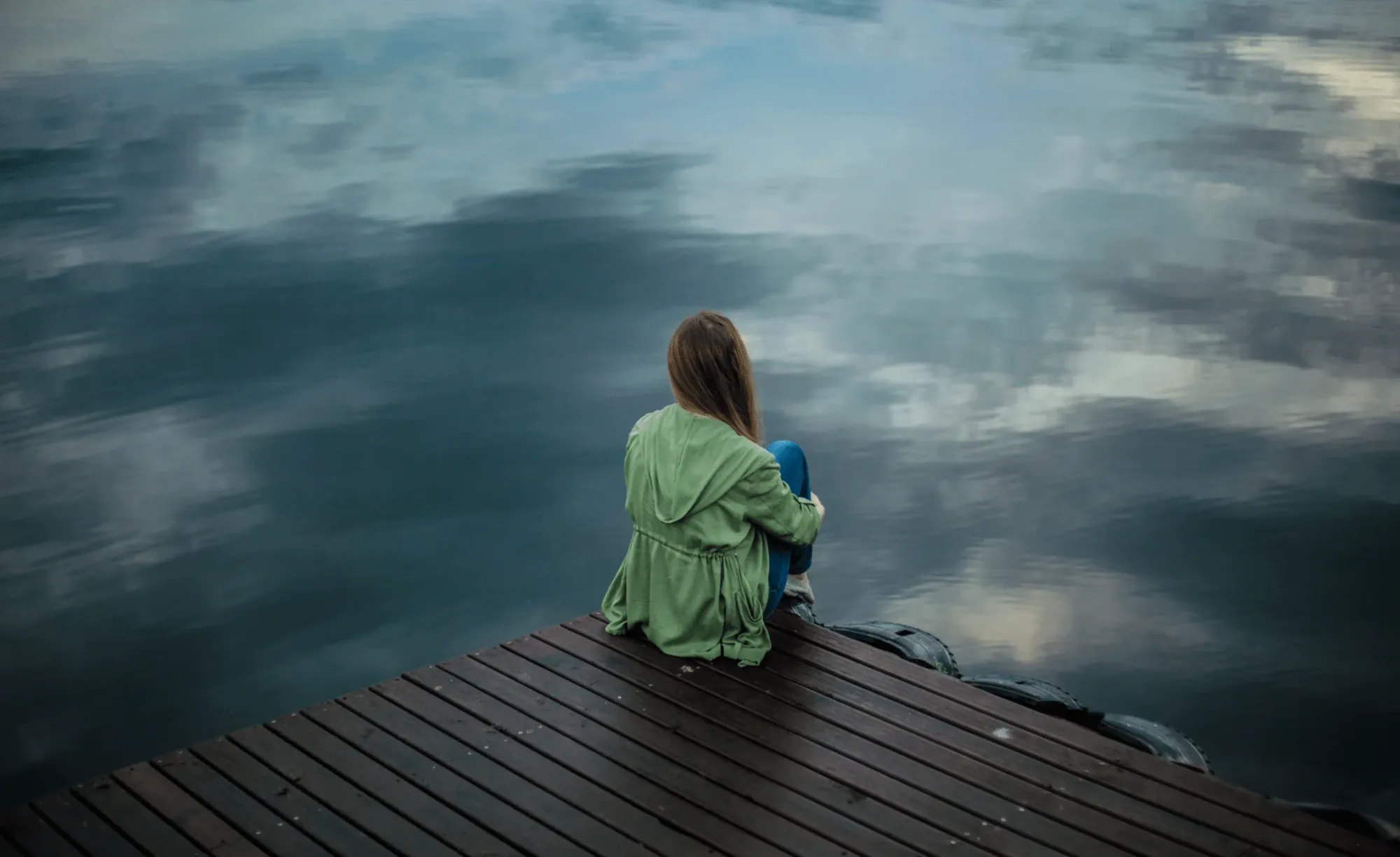
There are a bunch of factors that cause post-travel depression. These include physical symptoms like the impact of jet lag (you wouldn't believe how much having to re-regulate your sleep cycle can affect your mood), but most importantly, mental symptoms that are more often than not linked to how happy you are in your life back home.
According to Medical News Today , slipping back into an old routine —maybe one you're not in love with, to begin with—is a common trigger for post-travel depression.
And it makes sense. Society has been telling us to grind, make a living for ourselves, succeed no matter what. Up until a few years ago, the word "work-life balance" was considered a joke. But here's a reality check: we don't all have our dream job, or a sweet boss, or love the city we live in, or have the coolest friends. Maybe we don't love the reality and routine we have at home.
But when we travel, we have a second shot at creating the experience we want. We have the energy and desire to meet new people, have fun, try out a new sport we'd never do back home, and even learn to cook stuff. So much so that traveling has become the highlight in many people’s lives.
And even if you love your life back home, the tasks, responsibilities, and hectic pace that await you when you return are usually a source of stress. If you're in this box, the good news is you're probably going to experience the post-travel blues for a few days, then feel fine.
But for those of you who only feel alive when you're traveling, the gap between who you are during your travels and who you are at home can become so big that stress and depression hit hard. This can make readjusting to everyday life not just a challenge, but a severe emotional struggle.
How to manage post-travel depression
Now that I've discussed what post-travel depression is and what usually triggers it, let's focus on how to handle it and move past these symptoms.
I'll share 7 practical tips to help you deal with post-travel depression. Take notes and see which of these might work best for you.
1. Plan your return trip thoughtfully
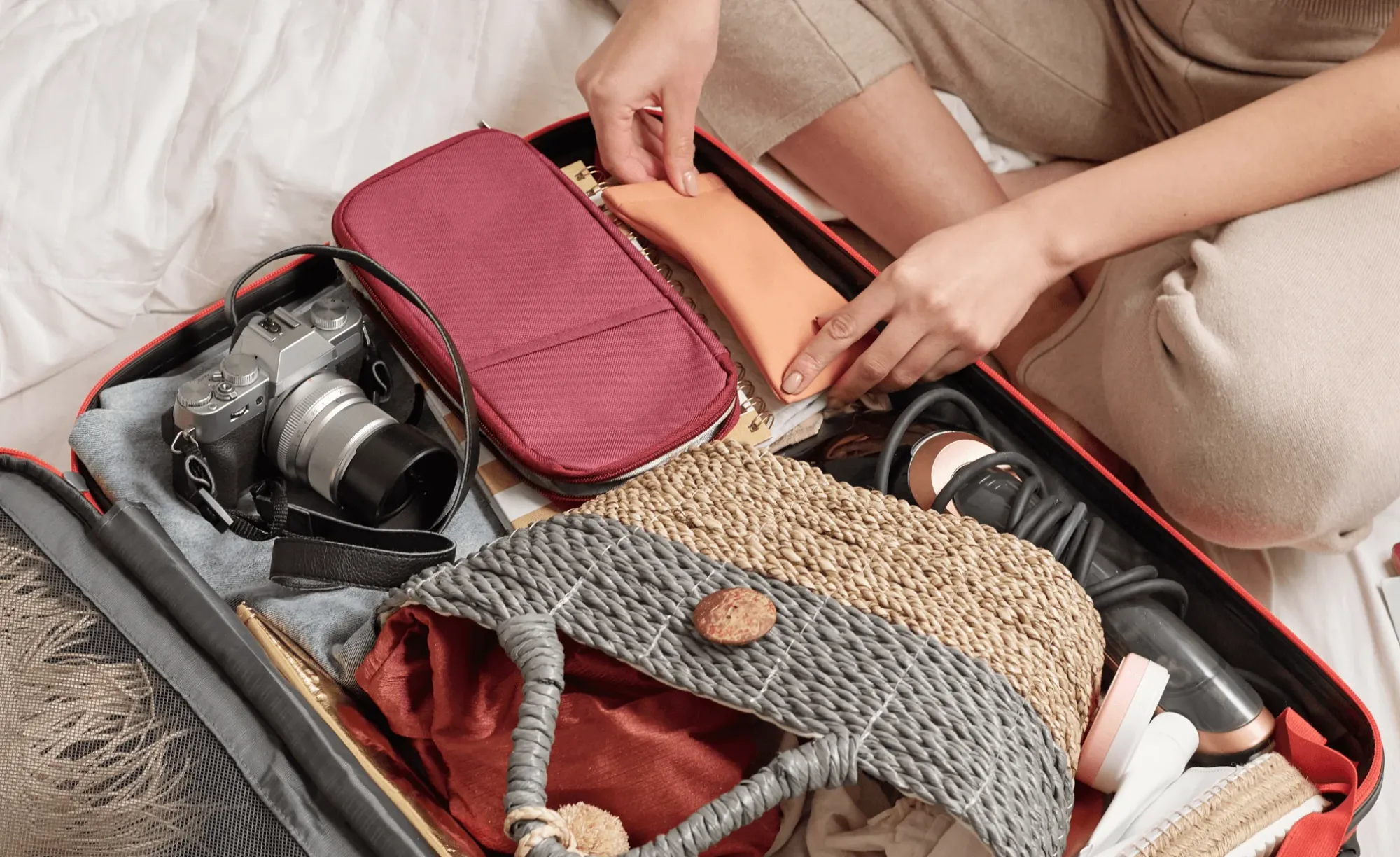
This tip is all about preventing that mess and stress you often feel when you get back home.
When you're traveling, you don't want to feel rushed. So why would you want to feel rushed when you're packing before boarding on your return flight? All that rush to make it in time to the airport, with the constant worry if you forgot something in your accommodation can seriously ruin all the relaxation you accumulated up until that point.
Instead of just throwing all your clothes in your luggage, take your time to plan your trip and pack without feeling rushed. This approach turns packing into a calming ritual that keeps the chaos at bay, not just when you're unpacking but also as you start thinking about heading home. Plus, it helps you ease back into your everyday life without feeling like you've been thrown back into it all of a sudden.
2. Plan to return home a few days early
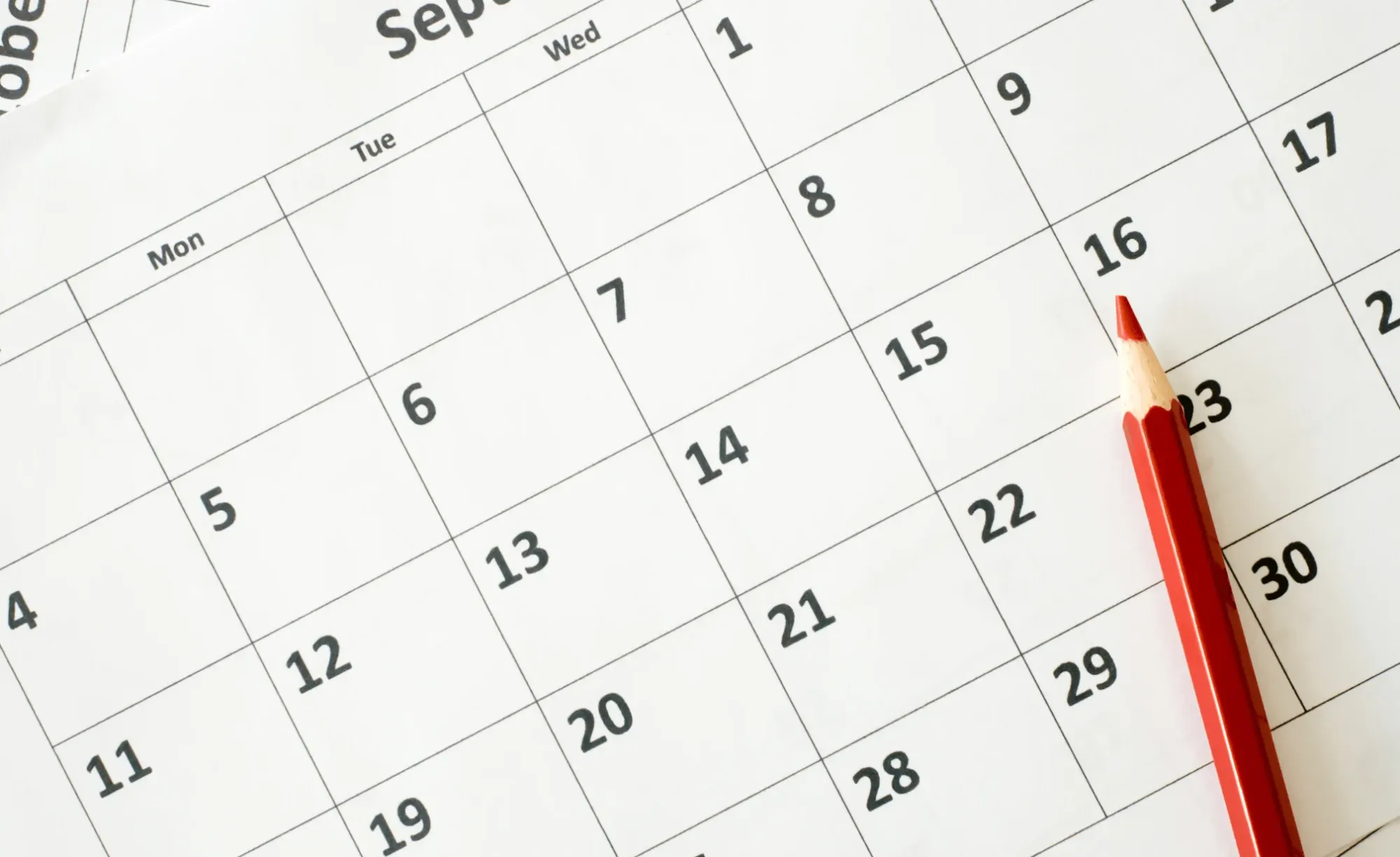
Yes, vacation time is precious, and it might seem hard to give up even a single day. But trust me, if you want to make your transition smooth and avoid feeling those post-travel blues, it's a must your return a few days early.
I have a friend who always plans his return flights a few days before the weekend, that way he has the whole weekend plus one or two days to readjust and get his mind and body ready to switch back from relax mode to work mode. Trust me, you don't want to go from spotting lions on a safari to replying to those "out of office" emails the day after you return from your trip.
Giving yourself some days to unwind after you return will give you some extra time to organize your routine without the added stress. Not to mention, it allows you to ground yourself again.
3. Stay active
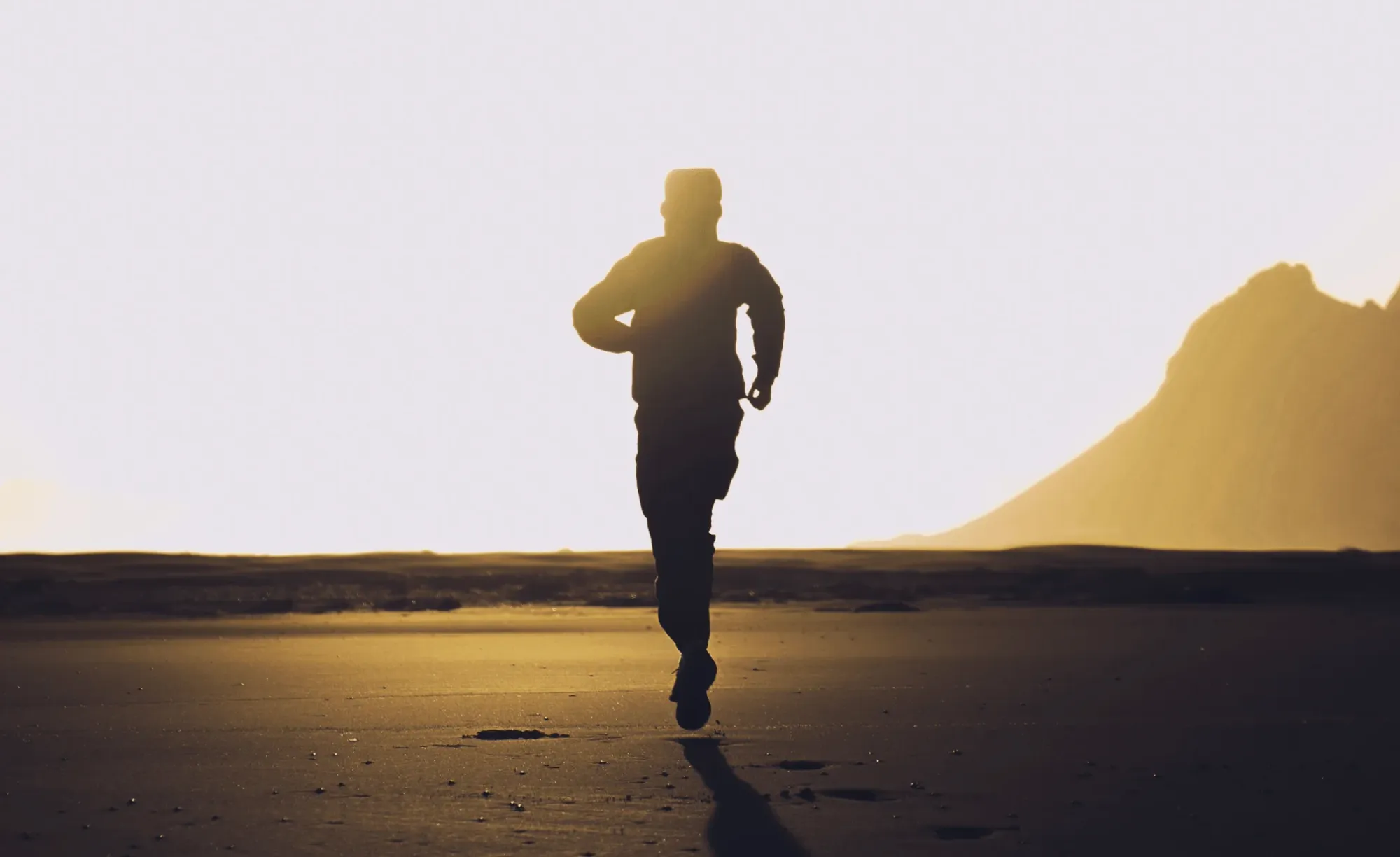
I bet you probably spent your travels exploring new places, hiking in beautiful areas, getting your dose of vitamin sea in some tropical destination. Now, I'm pretty sure the Monday right after you return from your travels will most likely be you sitting in front of a desk for countless hours.
We don't need an expert to tell us the routine you had while traveling was healthier for your body than the one you probably have at home. That's why it's essential for you to keep moving and stay active once you're back. Even if you're a couch potato, get up and start moving! Harvard Medical School reported that a recent study found that " Running for 15 minutes a day or walking for an hour reduces the risk of major depression." So, the third trick to beat post-travel depression is easy: get up and move.
4. Pay attention to your diet

Have you seen the Netflix docu-series "You Are What You Eat?" Me either. But I don't need to watch it to tell you the title nails my next piece of advice.
If you've spent the last few weeks traveling the world, chances are your diet was better than the one you're used to at home. The Standard American Diet — aka SAD (I know, the acronym says it all) — lacks the right amounts of fresh fruits, vegetables, whole grains, lean proteins, and healthy oils other diets are known for. Instead, it's excessively high in red meat, high-fat dairy products, processed and fast foods, added sugars, etc.
But even if you think your body is craving a burger, trust me, especially if you're feeling low, it's best to go for fresh, plant-based foods, like berries—which are good sources of antioxidants. Because believe it or not, eating balanced meals can boost your mood, help you sleep better, and shake off some of those stress-related symptoms of post-travel depression .
5. Keep traveling
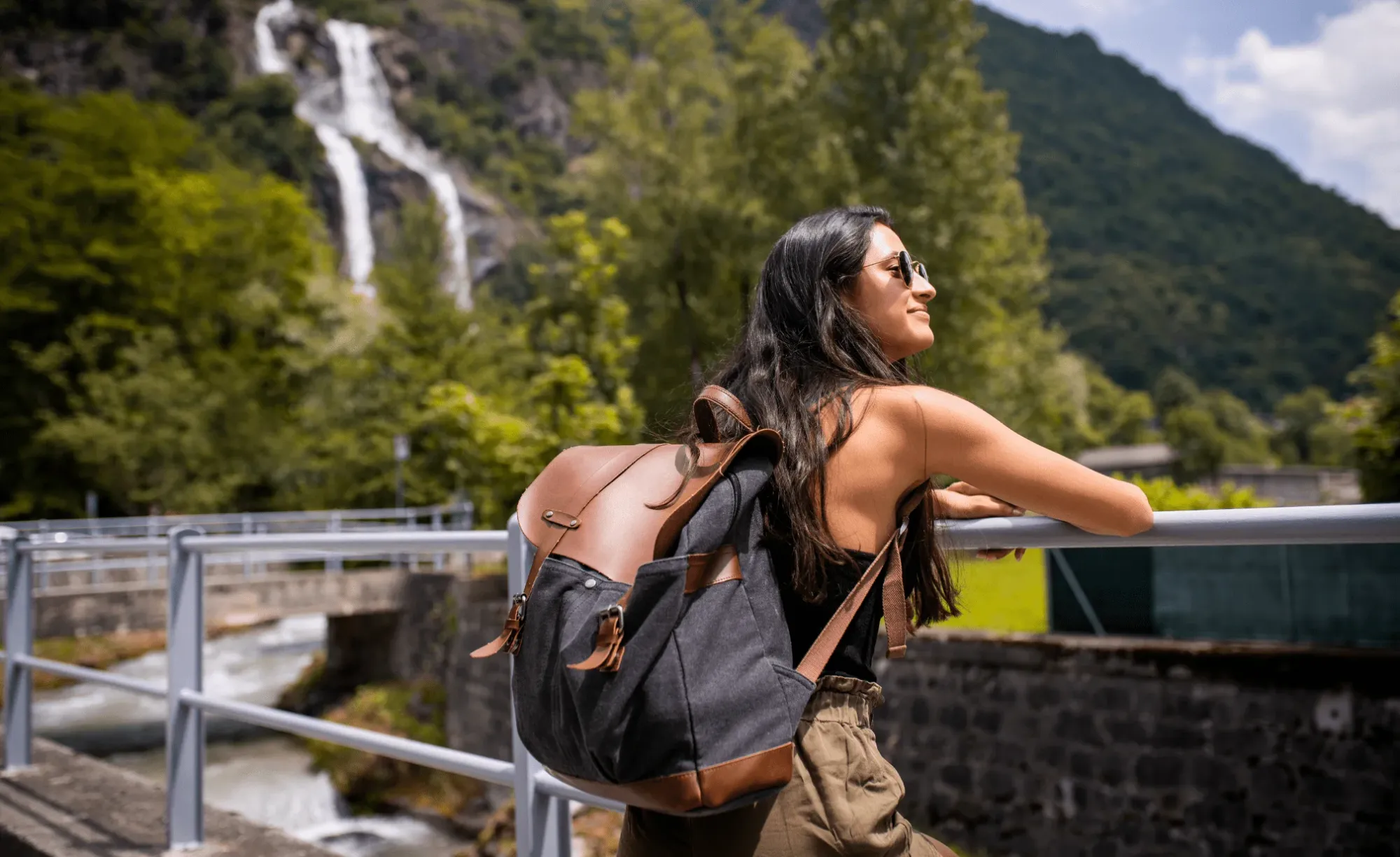
Just because you're back from a trip doesn't mean you have to plunge straight into work and responsibilities. Think of it this way: one adventure has just ended, and now you've got the chance to start planning the next one.
If you're constantly thinking about traveling, why not begin planning out your next trip, weekend getaway or even day trip to explore some local spots you've never been to before ? I'm pretty sure there's a hidden gem just around the corner that could be perfect for next weekend. Keep that traveler’s spirit alive!
If instead you want to pamper yourself, maybe look up a day spa in your area or a laid-back spa package.
6. Ease back into your routine
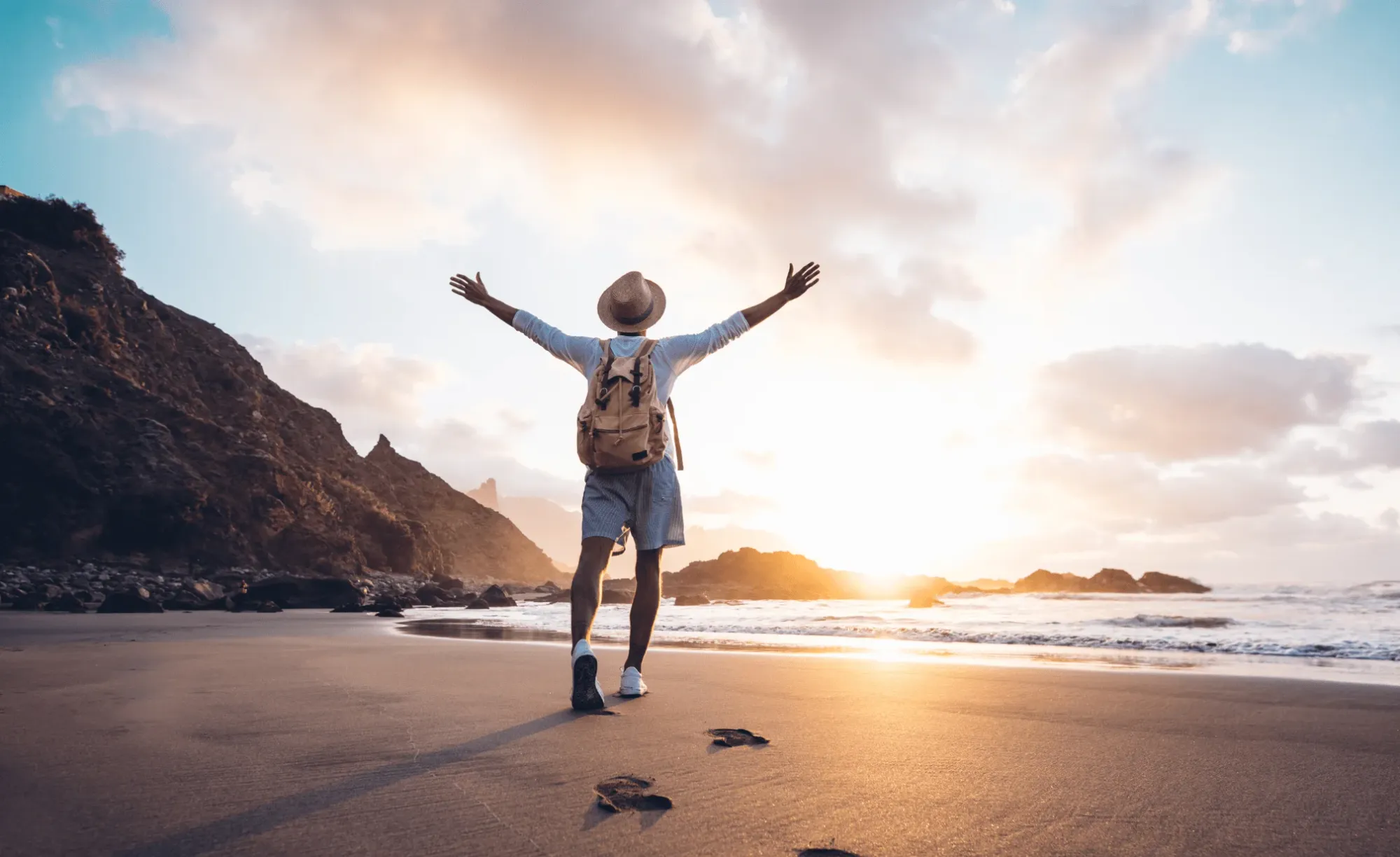
This one goes hand-in-hand with planning your return a few days early. Again, you may not think going from exploring to working could have any effect on your mood, but it definitely does.
Instead of going through a checklist of to-dos as soon as you get back, ease back into your daily routine. Take your time and allow yourself some moments to just breathe and detach. You're human, after all. If you have loads of things to do, instead of freaking out about the amount of workload that's waiting for you, set some small, realistic goals for the coming days and weeks to make your transition smoother.
7. Spend time with people who matter
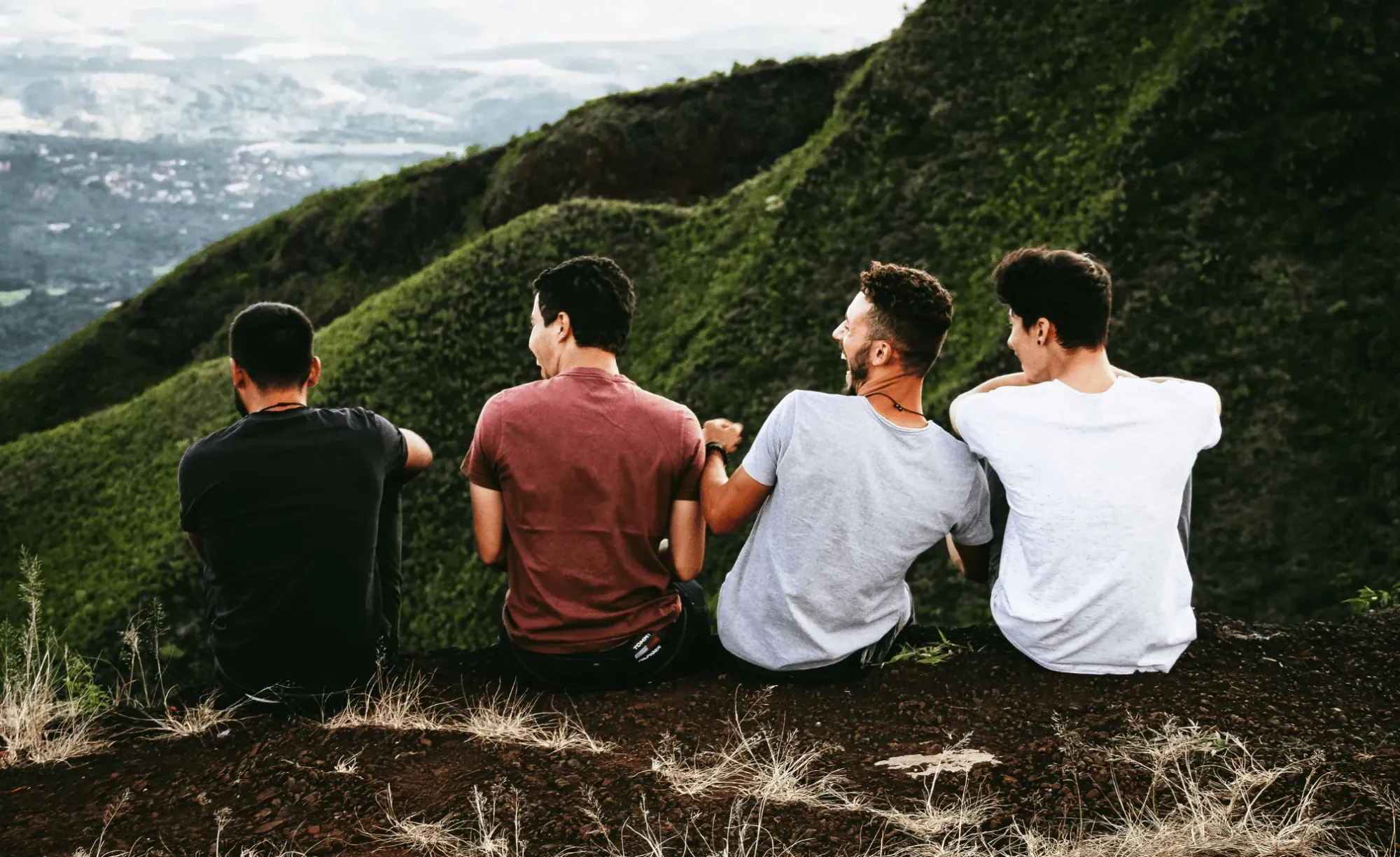
Skip posting everything on your Instagram stories and instead meet up with your friends and family to tell each other about the adventures you had while traveling. Remember your swimming with turtles for the first time experience? Share it with them! Reach out to the people that matter in your life and plan a day out, hang out, or just grab dinner and some drinks together.
Remember, if you're experiencing any of the post-travel depression symptoms I mentioned before, the last thing you should do is isolate yourself! I know that keeping to yourself might be what you think you want but being alone won’t do any favors for your mood.
I’ve tried to soldier through on my own before, and it just made things worse. Trust me, being around people who care about you can really lift your spirit.
Wrapping up
So here they are, the seven tips that can really help with post-travel depression. If you're experiencing post-travel depression right now, don't worry, we've all been there. As in everything, learning how to deal with these emotions comes with experience. But there’s one more thing I want to talk to you about, something a bit more serious .
If you've been feeling really low for a while now, noticing that these tips aren’t helping much, and you’re stuck in a phase of sadness or depression, it might be a good idea to talk to someone about it .
I know, it's tough to admit sometimes, but feeling down after returning from a trip isn’t unusual, and it’s definitely not something to feel embarrassed about. I’ve been there, and I know many others have too. That’s actually why I wrote this article—I wanted to give some tips that can help you make your transition back home less stressful.
But if you’re really struggling and can’t seem to shake it off, please think about getting some professional help . Taking care of your mental health is super important remember, with the right approach, it’s completely possible to easily bounce back from post-travel depression.
Ready to beat the post-travel blues?
If you want more digital nomad guides like these, sign up for our free newsletter and get upcoming articles straight to your inbox!

Sign up for our Newsletter
Receive nomad stories, tips, news, and resources every week!
100% free. No spam. Unsubscribe anytime.
You can also follow us on Instagram and join our Facebook Group if you want to get in touch with other members of our growing digital nomad community!
We'll see you there, Freaking Nomads!
Disclosure: Hey, just a heads up that some of the links in this article are affiliate links. This means that, if you buy through our links, we may earn a small commission that helps us create helpful content for the community. We only recommend products if we think they will add value, so thanks for supporting us!
How To Create a Healthy Work-Life Balance While Working Remotely
Wise travel debit card review: fees, exchange rates, limits and how to use it, how to set up and manage an esim on iphone.
Post-vacation depression is common, a psychologist says. Here's how to beat the post-holiday blues.
- Dr. Daniel Glazer is a clinical psychologist.
- He says it's common for people to feel down after returning from vacation.
- He recommends people keep track of their memories and bring something home with them from the trip.

This as-told-to essay is based on a conversation with Daniel Glazer . The following has been edited for length and clarity.
You go on a great holiday — a hiking vacation with your partner or a cruise with the family. It's a wonderful time, but when you get back to the hustle of your normal day-to-day, you might find yourself feeling down. It's something I've seen time and again with my patients as a psychologist: spikes in anxiety and moodiness after time away.
We go on vacation to escape from the demands of reality. But when you come home and realize you've got to step back into that life you wanted to get away from, there's tension.
Sometimes, there's a deeper reason for feeling down. At the beginning of vacation, we're full of excitement and anticipation. But by the end, it can feel like the good times gone by in the blink of an eye. Something precious, starting and ending, can bring up feelings about our own mortality and the fleeting nature of life.
All of this is no reason to skip your next vacation, however. Here are six ways to fight the post-vacation blues and make sure your time away ends on a positive note.
Keep track of your memories
Vacations are about unplugging, but they're also about creating new, positive memories. Whether it's simple moments, big thrills, or life-changing experiences, travel is full of memories. Keeping track of those is a great way to reflect on your vacation and realize just how much you got from your time away.
There are a few ways to go about this. You can try scrapbooking — which has the added benefit of being a great way to unplug after you return home. Or, you can opt for the modern version by posting on social media — just make sure you're doing it for yourself, not for the dopamine hit of all those likes.
Related stories
Journaling or writing a letter about your experience can also help you foster gratitude for everything you experienced during your time off.
Learn a new skill and bring it home with you
Lifelong learners who have a keen sense of curiosity are more confident, resilient, and able to cope with stress. You can foster these benefits by trying something new on vacation and then bringing that experience home with you.
Maybe you continue to cook a favorite dish you ate in Europe or sneak in phrases of a language you picked up before you departed. These actions keep your sense of adventure alive and give you a level of playfulness even when you're back to work.
Spend time with friends and family
Vacations can be times of intense bonding, whether you're traveling with your family members or bonding with strangers on a group tour. Human interaction releases lots of feel-good neurotransmitters. But when we get home and no longer have an intense connection, we can feel lonely.
To avoid that, arrange to spend time with friends and family when you get back from your holiday. You can catch up with them and tell them about your travels, which has the dual benefit of encouraging gratitude while also creating connections with others.
Follow healthy habits
On vacation, you might tend to eat lots of treats, drink a bit too much, and stay up late. When you return home, getting back into your routine can be difficult, especially if you're battling jet lag.
Switch your cocktails for mocktails, start following a good sleep hygiene routine, and make sure you're getting plenty of exercise. Spending time in nature can help reset your circadian rhythms when they've been thrown off by jet lag, and it will also help boost your mood.
Expect some anxiety
We often think of anxiety as a problem that needs to be fixed as soon as possible. But really, anxiety is a normal part of being human. It's ok to expect some mood changes when you get back from vacation.
Know when you need to make bigger changes
If your symptoms start interfering with your day-to-day schedule, or you really dread returning to your job and other obligations, take some time to examine why — a qualified therapist can help with this. If you're very uncomfortable, it can be a sign that some things in your life—like your job, hobbies, or the amount of time you have to yourself — need to change.
Watch: NYU professor says Facebook should pay taxes for making us less productive
- Main content

What Is After Travel Depression? SIMPLE Strategies On How To Cope!
THIS POST MAY CONTAIN COMPENSATED LINKS. FIND MORE INFO IN MY DISCLAIMER.
Home » What Is After Travel Depression? SIMPLE Strategies On How To Cope!
Post-holiday blues can sneak up on you and completely smack you off your feet! It can suck the life and happy vibes right out of your soul.
Going from one extreme of the buzz of exploring a new country, destination, or culture to being back in boring reality can be pretty daunting!
Not all of us can travel full-time even if we wanted to! So for some of us, this is reality!
Coming home after traveling, returning to work, and returning to routine.
Post-travel depression after a trip is so real that they even have an acronym for it – PTD. Go figure!
In this Post:
1: Why do we feel the post-trip blues?
2: How to get over post-travel depression
3: Benefits of after-travel depression – because yes, there are some!
What is Post Holiday Blues?
Post-vacation blues or post-holiday blues is a type of depressed and anxious mood that holidaymakers often experience when returning home from a trip.
While symptoms usually are mild feelings of being dissatisfied with life, they might also include short bouts of crying after vacation has ended.
Why do we feel the Post Travel Blues?
It seems that there can be a multitude of reasons why we feel depressed after vacation. Travel is beneficial to our health in so many ways.
There are valid reasons for these post-holiday blues, and true reasons as to why it is so hard to adjust back to your normal way of life.
This image from Getaway Brigade wraps the post-holiday depression symptoms real well.
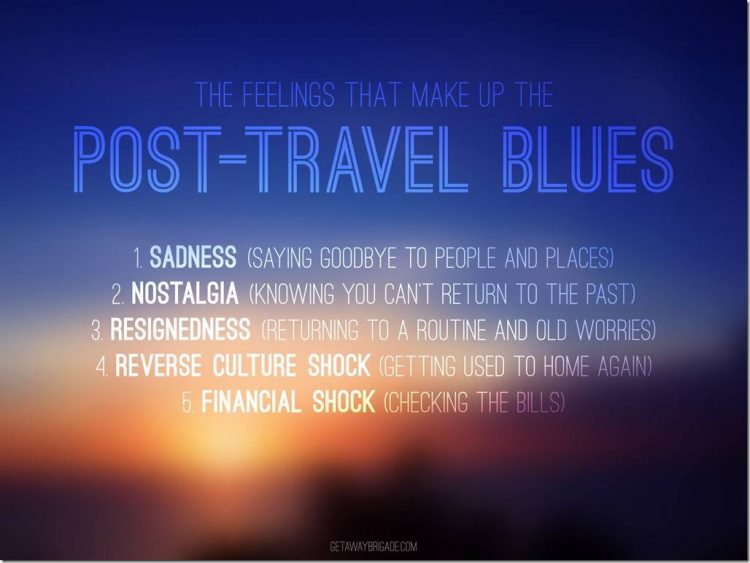
5 Typical Post Travel Depression Symptoms
The symptoms of post-holiday depression can really include some or even all of the following: anxiety, fatigue, irritability, mood swings, headaches, sleeping too much or too little, change in appetite, weight loss or gain, inability to concentrate, increased desire to be alone, and loss of interest in things you usually enjoy.
Clinical psychologist Linda Blair says: ‘Bear in mind it takes a good three days to wind down when you go on holiday so likewise, it will take you a bit of time to re-immerse yourself in real life.’
My Story of Travel Depression Anxiety:
We recently came back from a family holiday to Cambodia . I am now on long service leave and therefore have no job except for blogging to return to, I thought our return from Cambodia would be a happy one!
However, knowing we are home-bound for my last trimester of pregnancy and the birth of my baby has escalated my post-traveling depression to a new dimension.
There is nothing like feeling like you are stuck!! That you have no choice but to be where you are right this minute!
No matter how strong you can feel the pull to explore and wander some more.
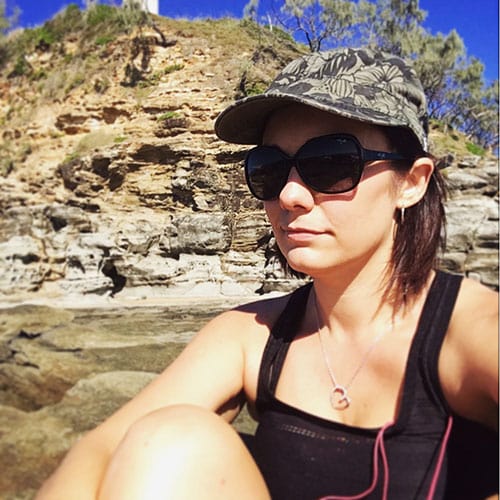
I think that to some extent all of the points in the image; that outlines the reasons for depression after traveling; applies to our return after coming back from holiday! Understanding post-trip depression helps you to move beyond the symptoms.
1. The sadness from leaving behind a new country explored, the friendships made along the way, and the favorite destinations in the country that connected with your soul, all of which have the potential to leave you feeling depressed after traveling.
2. The nostalgia that comes from having an awesome trip and knowing that it is a once-in-a-lifetime memory!
3. Having to return to the routine of life , the school lunches, the school drop-offs! Having to do our own washing again and make our own meals.
Knowing that there is no adventure or excitement awaiting us every single day and that some days will just be ‘boring’ as we get some jobs and housework out of the way!
4. Reverse culture shock ! I think we have felt reverse culture shock to the extremes on our return from our two last trips!
Visiting countries where people have to go through a harder lifestyle than us and experiencing how people who work incredibly hard and have so few material things against their names, can be so incredibly happy with life!
And here we are, lucky and fortunate in a country where luxury is almost a given and material things consume our lives! The difference between our lifestyle compared to theirs really struck us!
5. And of course, even as travel bloggers we still come home with a credit card bill that we need to repay before our next travels!
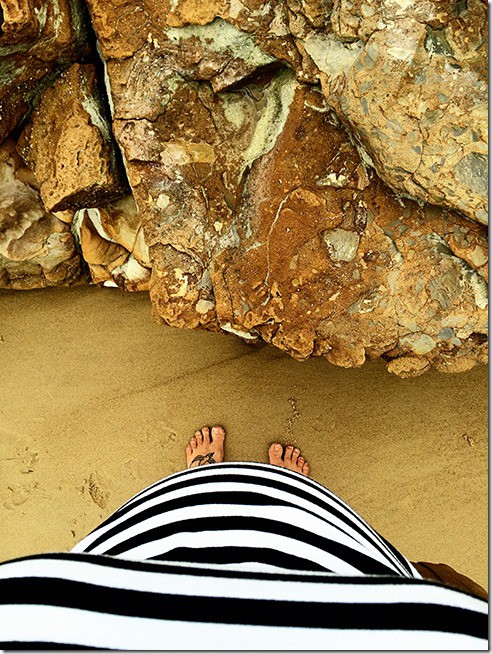
At 24 weeks pregnant, I could barely see those wanderlust feet of mine!
I have restless soul syndrome! And this being ‘stuck’ at home is making my after traveling depression pretty damn real!
How to Beat the Post-Travel Depression
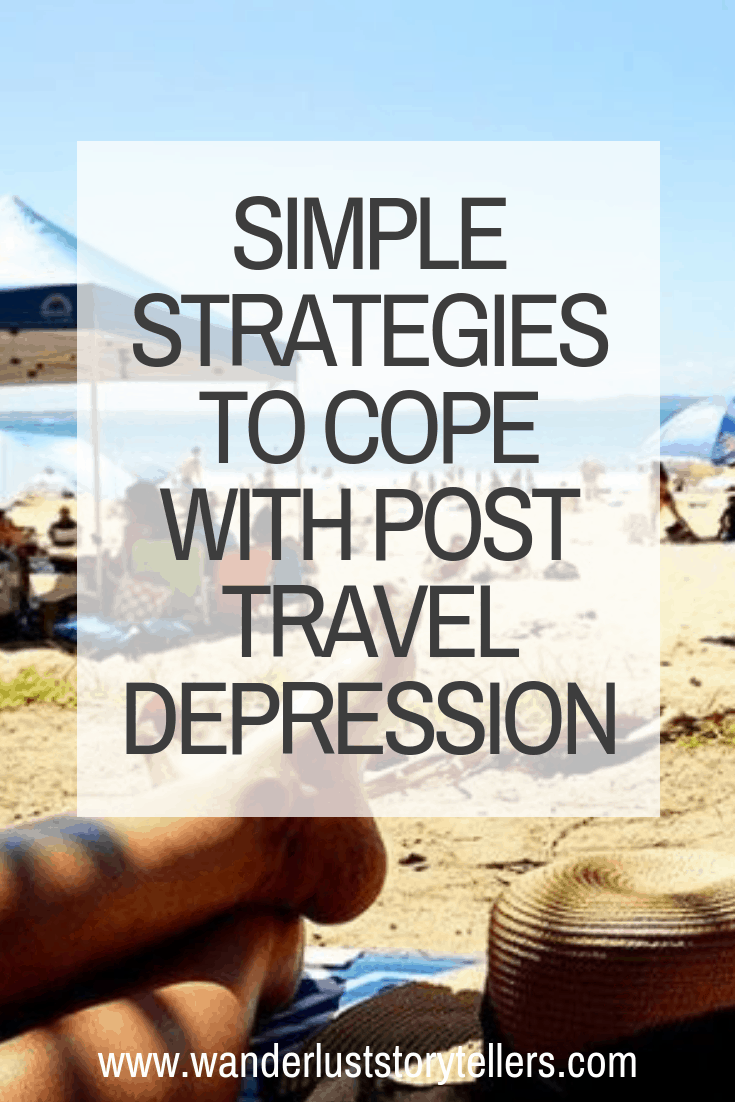
Below is a list of ideas on how to deal with post-travel depression.
Now as an important side note, if you have more than post-holiday blues and it is edging towards severe depression after vacation, you really need to stop reading my post and get yourself some professional help.
1. Allow yourself time to adjust
It is important to realize that it is pretty normal to feel depressed after travelling.
And often we used up our energy on an adrenaline rush to explore a new destination, only to get back home with little to zero energy left for the normal everyday stuff.
Next, it is important to deal with jet lag. “The body clock, which is in the brain in the hypothalamus, takes a few days to adjust to the timing of light and darkness at the destination, and this disrupted rhythm results in a host of unpleasant symptoms, including tiredness, headache, disorientation, poor concentration, and indigestion,” explains Dr Peter Prendergast of Venus Medical.
Allow yourself time to adjust and do expect a level of after-trip depression to show up.
If at all possible, build in an extra vacation day at the end of your trip to simply be at home and recover!
2. Keep hold of your Travel Memories in a creative way
One of the easiest ways to help move past the depression after travel is to start working on recording those travel memories in some creative way.
“Research has shown that if we can recall positive memories they can boost our positive emotions at the moment,” says Dr Green, a clinical psychologist and founder of The Positivity Institute.
- Turn your favorite travel photos into canvas prints. We love finding cheap canvas deals with Easy Canvas Prints. Grab your 25% off plus FREE shipping with our link.
- Make a slideshow or montage from your favorite travel photos and videos. Then you can easily watch it back and revisit your incredible memories, plus you can share it with friends.
- Write blog posts about your travels.
- Create a coffee photo book for your vacation. My go-to photo book printing company is Blurb!
- Get hands-on and lose yourself in the art and craft of scrapbooking. I love to create travel scrapbooks of my trips so that I can include ticket stubs and pamphlets from the holiday. A brilliant product to organize all your ticket stubs is Just the Ticket: Ticket Stub Organizer . A really awesome product!
3. Be a Tourist in your own Area
While we are grounded for the last trimester we are doing our best to keep the wanderlust bug at bay by exploring more of the local area!
Recently we had a beautiful and relaxing day exploring all that Noosa on the Sunshine Coast has to offer! Blog research of course!
But at least it gets us out and exploring. I think this view says it all!
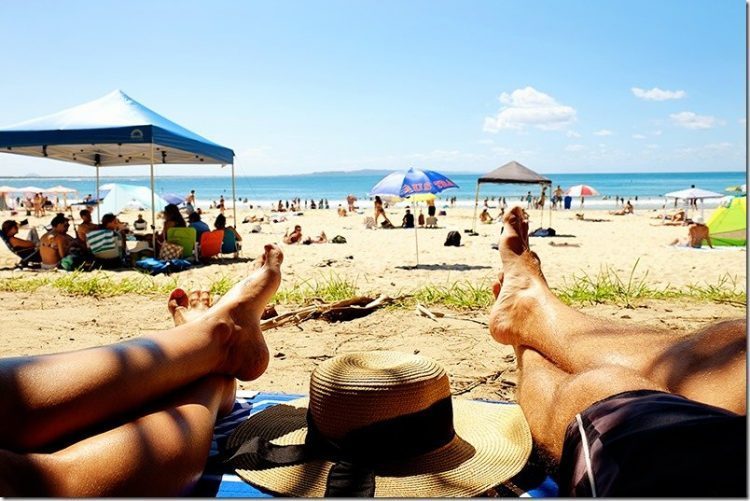
4. Evaluate what isn’t working
Maybe it is time to look at why home life is so depressing. Are you too busy? Do you need to change your job?
Do you need more balance in life? Do you have fun hobbies and activities that you participate in?
Ask yourself some questions and try to understand why being home is so hard. Can you make any changes?
A really good book to read is The 4-Hour Workweek: Escape 9-5, Live Anywhere, and Join the New Rich . It is a great eye-opener to looking at life with fresh eyes and reevaluating whether the 9-5 lifestyle is making you happy.
5. Practice thankfulness through a gratitude journal
My passion area in counseling is meditation and gratitude. Gratitude is so incredibly powerful.
When you express gratitude (or thankfulness), you create a surge of ”feel-good” brain chemicals like dopamine, serotonin, and oxytocin.
In fact, several studies show that being grateful reduces the risk of depression.
I did a research project in my master of counseling that was centered around gratitude’s connection with well-being and happiness and the results were incredible!
There are two super easy ways to practice gratitude. You might choose to share your thoughts on thankfulness with another person.
We do this every night around the dinner table. Or for those who love to keep their thoughts private, you might choose to express your gratitude by journaling.
I personally love The Gratitude Diaries: How a Year Looking on the Bright Side Can Transform Your Life ! You will be surprised how beneficial thankfulness can be when you are struggling with post-travel depression.
6. Start planning the next trip!
I love planning trips! That is something that I enjoy even more than writing about them post-trip.
So even though I know we can’t head anywhere far from home till baby-love is at least 6 weeks old, I am already planning and prepping for our next trip abroad!
We have already bought tickets for our entire family for a trip to Bali, Lombok and Gili Islands!
I’m onto finding our accommodation and slowly making my way through figuring out which day trips will be newborn-baby-friendly whilst there!
It keeps me moving forward and it keeps me motivated! The blues are still there in the background, lingering around, but at least I can choose to focus on something more pleasant than to just sulk around!
Planning a trip, no matter how prematurely can be really beneficial.
Dr Green, a clinical psychologist and founder of The Positivity Institute, says: “Research tells us that anticipation of the experience of pleasure is nearly as pleasurable as the experience itself.”
So even if the trip is years away, go and start brainstorming where you want to go and what you want to see.
Books are always brilliant for inspiring some travel ideas. Here are some of my favorites!
7. Use journaling to foster positive change
Journaling is another powerful tool that you can make use of. It can be so ‘releasing’ to simply get your thoughts out on paper.
Clear out your brain for more positive and happy thoughts.
If your head is full of negativity, it can be hard to squeeze in positive thoughts, so grab a journal and release the thoughts that are currently there.
Make it a daily practice. And simply write 1-3 pages every morning or every night. Write whatever comes up in your brain, the idea here is to simply let go and get it out!
8. Pick a job that allows you to earn whilst traveling!
What do you currently do for a living? Could you incorporate travel into your career?
For example a teacher can teach anywhere in the world. A hairdresser can cut hair wherever they want. See our post on the best travel jobs in the world .
9. Find out what your future has in store!
How about trying something different and somewhat exciting? Reach out to an alternative option and seek a place that can provide you with a free psychic reading.
This way you might get a glimpse into your future and create excitement that open you up to new possibilities.
As hard as it is to live with post travel depression, especially when you know that there are no immediate trips in your near future, there is actually a positive side to the misery that comes from the blues that follows a holiday. For me it teaches you about aspects of yourself or your life that you are not happy with! Why did these emotions tackle me and what is it that I need to change in order to be happier to return home in the future? What is working in your life and what is not! Travel is addictive, but it is also important to have an addictive lifestyle that you are passionate about even when you are NOT traveling!
Benefits of Post-Vacation Blues
- Post-travel depression can help us figure out what we are not enjoying about our current way of life, and open our eyes to what we are truly passionate about!
- It opens our yearning to do more with our lives, to be more, to travel more, to learn and discover more!
- Post-travel depression is a great motivator to start saving those dollars for the next trip away!
- It makes you appreciate how lucky we truly are to be able to travel and explore other countries and other ways of life!
- It makes us re-evaluate how we live and makes us notice the things that we tend to normally take for granted!
- It makes us take action to break away from the normal routines of life!
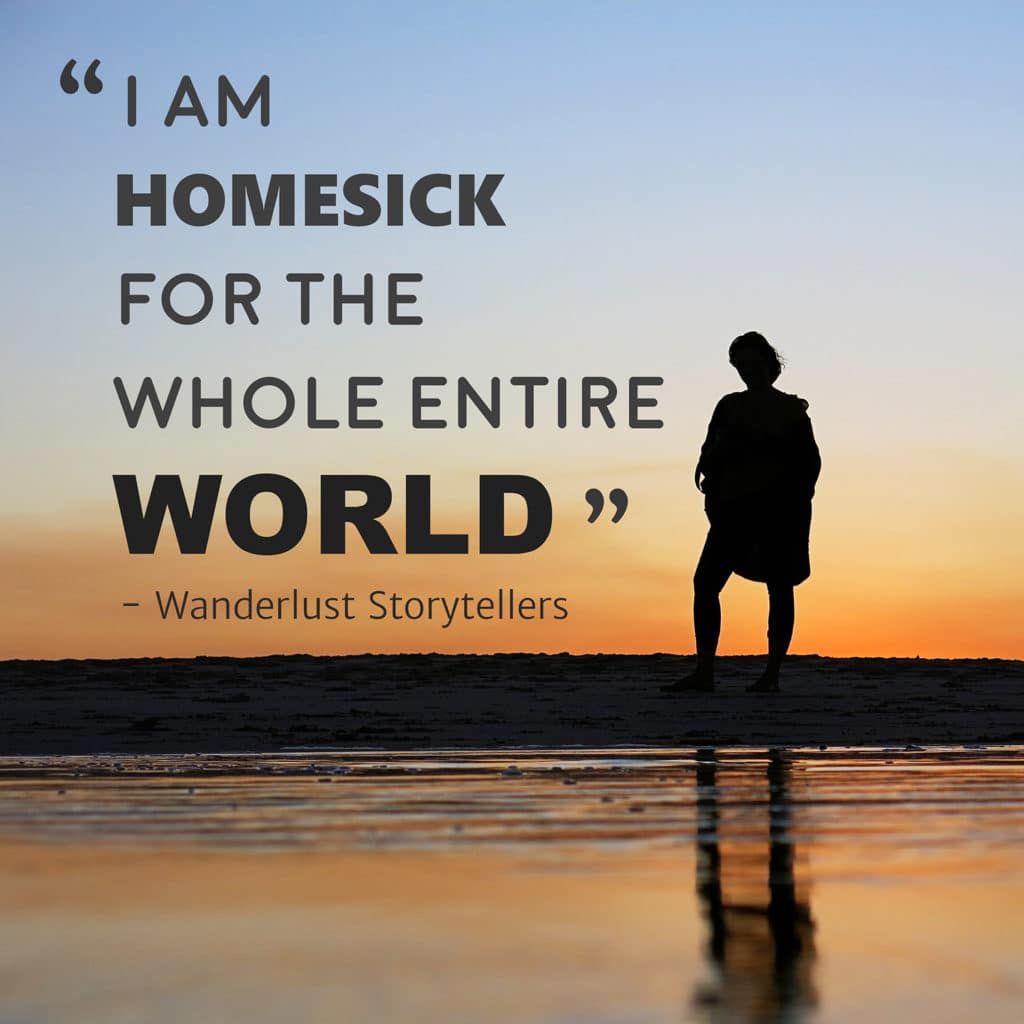
Post Travel Depression Quotes – Because for some Reason Quotes Help! What about you! Have you ever suffered from after holiday blues ? What did you learn from feeling depressed after vacation? What did you do to overcome your post trip depression ?
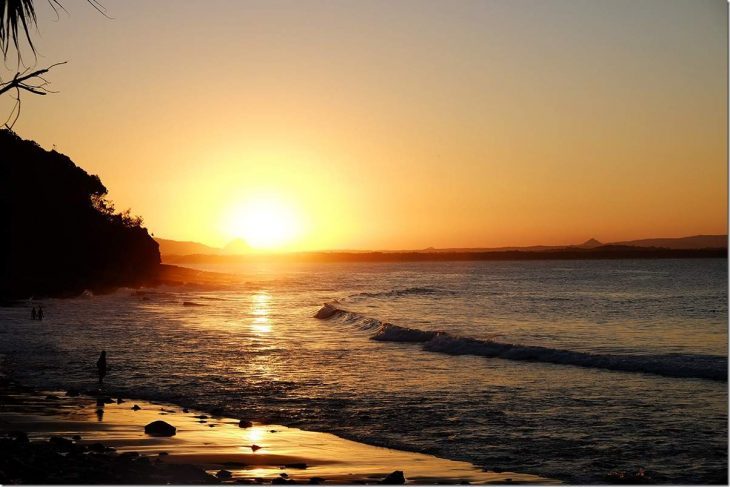
Beautiful photo of a sunset at a beach in Noosa National Park! Sometimes beauty lies just beyond your front door!
Travel; makes u grateful for what u have, but also opens your eyes to how different life could be!

Jolene Ejmont
44 thoughts on “what is after travel depression simple strategies on how to cope”.
as travel blogger somehow i feel greedy to explore all the world but when i see my pocket is empty but does not mean stopping from travelling
Yes very true!
I know this feeling too well – having several places that feel like home around Europe. In the end it’s always the people you miss the most! Would someone invent teleporting already?? 🙂
Yes please!!! 🙂
^^^ If only teleportation was possible, right? I was actually in Cape Town for 10 weeks and am back in the US. PTD has been hitting me quite hard and it’s so difficult to shake it off. I’ve met with friends and have been running errands all around but nothing feels right. It’s as if time stood still here and nothing has changed. I love my friends and family and am still in graduate school, so I do have things to take care of, but nothing compares to the experiences I had in South Africa. I felt as if I had so much growth abroad that it’s hard to avoid reverting to old ways being back home. The only thing keeping me motivated is planning another trip. Just have to figure out the financial means to make that happen again.
It is hard isn’t it!! Especially when you connect with destination as much as you have in SA (I love Cape Town! Can’t wait to return myself!). I think the more we travel than more we yearn for more and more and more! I hope you get to travel again soon!! At least planning the next trip is exciting, we have 2 weeks till our next trip and I can’t wait!!
Struggling big time now. Been home 4 days and can’t stand it. Next 4 trips are booked in but I just wanna go now!!
It is hard isn’t it!! Best way is to just be on a permanent holiday … if only that was possible!! Hope that next trip is soon for you! 🙂
Currently suffering PTD ???? Just camr back from almost 3 weeks in Japan & its hitting me at some times of the day. Having been to Japan vs my hometown is very depressing as I can see the wide difference… trying to shake it off… this has been the longest vacation I had.. now I’m trying to plan my next trip back as a diversion… even normal.office routine is hard
Yes!! PTD is not fun! I have experienced it and have seen it in my friends too! We just came back from a 3 week trip to Japan too! Talk about a coincidence!! And yes, I am in full swing planning our trip to France!!! Trying to keep busy, but already over the routine of life at home! Hope things look up for you soon Mylene!
Just returned from a 2 year trip, I definitely feel it! You are on point when you say that it makes you realize how lucky we are to be able to travel. And reverse travel shock? BIG TIME! I love returning home but it only takes a few short weeks to get me ready for the next adventure!
Edit: Reverse CULTURE shock*
The part where you said “it teaches you about aspects of yourself or your life that you are not happy with” really resonated with me. After coming back from my travels, I always get a clearer perspective of what’s keeping me unhappy and what sort of changes I should finally make to move towards happiness. Very awesome and insightful post!
Exactly! And whilst that might be hard, change and moving forward in life is always good! 🙂
Sometimes we just don’t want to go back to real life, it takes a few days for us to get back to normal after traveling to awesome places.
Yes, I think it is normal to have a few hard days back in reality! The problem is when those few days turn into weeks or a month 🙂
I came back from my first trip abroad. I had some sought of internship in London . Then I visited Scotland where I had so much fun and met so many people. After that I went to lake district where I took part in many adventure activities . Overall I felt different about myself and I felt different I can’t explain it . It was roughly 1 and a half month trip. Now I am back in India and I just miss everything . Sometimes , it feels like I was a whole different person .
Hi Manvi, I definitely think that you can be a different version of yourself in different cultures. I know that I felt more ‘at peace’ with myself in Italy. I hope that you adjust back to life in India soon and that you can experience more trips/internships in the future! Thanks for sharing your journey 🙂
Shout out to you people ….I love travelling but this was my first trip in 5 years to new York …it’s already been 22 days I came back from my vacation …I still feel like my mind doesn’t belong to where I am now ……those beautiful moments captured in camera makes me smile and I think why I had to leave those moments ….I wish I had a time travel machine….hope life will come down to normal ….but till now I don’t want to be where I am now ….just want to go where I was for two weeks ….is there any medicine to come over this depression ? I am in London now …
Hi Rana, it is fairly normal to feel like this! We just returned from a trip to Europe and it has been a struggle to adjust again. My heart just wants to head off again! It normally does fade over a few weeks time as you adjust back to normal life. But if you find that it doesn’t, see a doctor as they can prescribe some meds to help you if you need.
Hi Jolene, When I got back from my 2 weeks trip from Japan last year, I kept dreaming about the country every night for 2 weeks. Thanked God, I could overcome it after all. It was not easy though…. 🙁
I know this inclination too well – having a few places that vibe like home around America. At last, it’s dependably the general population you miss the most
Yes, it really can be like that when you just easily click with the culture of the destination you are visiting! 🙂
leaving tmr and the PTD is making me so upset, its already been a month time flies
Excellent Post. I guess, Stress is the most common thing that can be seen after Holidays. For that, I always make a list of all the things I want to do as soon as I come home. I think doing something exciting inspires you to live more and stress free. Infact I have watched a video also in which tips are given regarding how can we cope up with Post Holiday Blues and I really liked the third tip which states – Wear something you feel good in. Wearing something you like will definitely boost your mood. You can also take a look on the video https://www.youtube.com/watch?v=tEAYxer0kws , the other tips are also really useful.
Thanks Ashpreet! Great tips and thanks for sharing thanks for sharing the link to the video for those who would like to watch it.
Thank you for this, I thought I was losing my mind. Just back from exploring Bali and Thailand for a month and feel like I am in an alternate (sad) universe, crying for no reason. Grateful you shared about this and also write about the benefits, it is helping me, thank you!
Glad to hear it was helpful Talyn – Hope you recover from the PTD soon!
I just got back from Bali with my husband..beautiful country amazing people..we had initially went for a yoga retreat but unfortunately it wasn’t a good environment and our teacher did not plan well so we left the retreat and stayed in UBud for a few days..but before that the beginning of our vacation started at a resort before the yoga retreat and my husband suffered tremendously from the long plane flight and had possibly blood clot..so we spent several days back and forth to health clinic and hospital. Luckily they were able to help..but I think the stress with that plus the yoga retreat not being what we had hoped and then the long flight back home just took a toll on me 🙁 it’s been a week and I’ve had zero energy during the day and I’m wide awake at night 🙁 I feel resentful for the yoga teacher charging us 4,000.00 and have emailed her for 50% of our money back another lady was also upset with the environment and left too. We also had to pay for the hospital charged and unexpected hotel cost etch which was ok but I had this vision this would be the best trip ever and it wasn’t 🙁 all my friends were so excited to hear about our adventure and I just wanted to cry. The one thing that’s helping me is the new friendships I did make and the exposure of the culture and beautiful people…
Hi Marie, sounds like a disappointing trip. Sorry to hear about all the drama. Unfortunately, things sometimes go wrong no matter where we are in the world. Did you have any travel insurance for the trip? You should be able to claim for the hospital expenses etc on that? Hope that the yoga retreat helps to refund some of your money for you. I’m glad to hear that you are ending your comment on a happy note and I hope that the next weeks will go a bit better for you.
I am really glad to have come across this because I made me realize I am not alone in this struggle. I usually feel depressed every time I return home from a holiday that I enjoyed, and I find it hard to get back into the daily monotonous routine of life, such as going back to work, etc. I suffered a major bout of PTD about four years back after I returned from a trip to New Zealand. It was only a two week trip, but I guess I loved it so much I didn’t want it to end. Just got back a few days ago from a trip to Japan, and I am feeling the same way. The f funny thing is, the first couple days of the trip I am actually abit homesick, but then its like I start to get attached to the place and miss it so much once its time to go home. Its difficult talking to others about it because quite often they don’t really understand, they just feel you should get over it, and they may not share your own love/passion for travel. It is hard, but I also realize that all good things in life have to come to an end at some point. Rather than be depressed that its over, I try to be happy that it happened, and that I actually got the opportunity to go to these places. And of course, there is always tomorrow, and the chance to go back again one day. But its great to know I am not alone in this!
Thanks for sharing your story AGM. I love that you finish off your comment with loads of positive vibes and with a positive outlook on the future! All the best to you!
I just traveled to bali one week ago, and I’m still suffering PTD until now 🙁 what makes me sad the most is my friends. My friends and I went to Bali, we did everything together in there and now it feels weird when I’m not around them
That sounds hard Risma. Do they live close that you can organize some regular catch ups with them to help you a bit? Or maybe you guys could start planning your next ‘friends’ holiday?
I’ve been back for almost 3 months after 2 and a half years away travelling and STILL have bad PTD. No motivation to leave the house and wanting to be alone. Fear of reality. Enjoy spending time with my family but avoiding everyone else. I’m slowly getting better but it hit me hard.
Oh, Felicity that really sounds hard. I hope you have been getting some support from family and seeking some professional help you guide you through it all.
Thanks for this! We just returned from a 3 week trip to Israel where we celebrated our son’s Bar Mitzvah so it was a super special one to boot. 1 day in and I’m already experiencing PTD! Love your suggestions and will repost to my blog, AlyaBuzz! thanks and congrats on the baby!!!
Thanks so much! 🙂 Glad you found the suggestions helpful. Sounds like you had a super special trip!
This has helped so much. Thank you. I didn’t even realize there was a name to this phenomenon until recently, and already I feel much more not alone. I almost always experience PTD for trips which are longer than a weekend or a few days. Just yesterday I got back from a trip to Southern Africa. We started in Joburg, went to Kruger, Vic Falls, Sossusvlei in Namibia, and ended with Cape Town, and there were layovers both ways thru Istanbul. Altho the trip at times felt rushed since we squeezed in so much in just over two weeks, and there were tensions among us due to the difficulties of cohabitation with, (there was actually a couple fights with one friend), the trip overall was the blast of a lifetime, and really changed me personally. One friend in particular is very special to me, and I miss him the most already. The San Francisco Bay Area feels like a different planet from Southern Africa right now, even though I may have noticed similarities when I was actually there on the ground. I know I’ll get over it, but it’s just really tough right now. Maybe I’ll check this out in a few weeks and reflect back on my feelings then from now 🙂
Thanks for your comment Bobby. Grateful the post has helped – sometimes just knowing that your feelings are fairly normal helps your brain settle a bit. I do find that it hits me more when I visit countries that are just so diverse and different to Australia that I call home. Will be interesting to see your reflection in a few weeks, hope you leave us another comment 🙂 All the best.
Think I’m a bit late to the party here but so glad I found this post of yours. I have always struggled with PTD, as long as I can remember, but this time it’s worse than ever. I had a really rough year, I struggled with mental illness quite bad and ended up quitting my job. I moved to NYC after graduation and have a studio apartment there, so I spent most of my time there this year lonely and waiting for better days ahead. I just returned from my dream trip to Australia and New Zealand, went with my dad and stayed for almost a month. For the last few months this trip has been the only thing on my mind, the one thing that was getting me through everything else. I’d think “yeah ok today sucks but get through 60 more of these and then you get to go on your trip”. Now it’s over and I have to face that my day to day life isn’t something I’m happy with. I’d love to change direction but I’m fairly scared to. Not to mention I can’t help but think back to all the amazing times my dad and I had on vacation, and instead of the memories making me happy, it’s making me cry because I was so happy and it’s so different from how I normally feel. I also just miss the vacation excitement, waking up every day in a beautiful place ready for an adventure. I just hope this eases soon, I’ve dealt with it before but never to this extent. I had a panic attack on the flight home yesterday and have been having more since. Ugh. Anyway, I also find it funny that you live in the exact place I’m dying to be back at, yet you deal with PTD coming back there from elsewhere. So funny how where we live changes our view on everything. I’d love to be back in Noosa and on the Sunshine Coast but I’m sure if I lived there it’d be completely different. So weird how that all works.
Thank you very much for the comment Sarah, and apologies for a much-delayed reply.
As you said, it is funny how where we live changes our view on everything… We love coming back to Australia and to our home on the Sunshine Coast. Saying that, we still get the PTD regardless.
Hope that you will visit hte Sunshine Coast again soon 🙂 or that you have already been again, since you wrote this comment.
All the very best and safe travel in the future.
Thanks for writing this post. It’s inspired me to write about post holiday depression too 🙂 I’m certainly going through these strange feelings and crazy mixed confronting emotions with every interaction I’m having. It’s nice to read people have similar experiences
Yes, I think all travellers experience PTD to some extent. It is especially hard to not travel in the current times. All best to you and glad that we could inspire you to write about it as well. 🙂
Comments are closed.
2024 - Wanderlust Storytellers. All Rights Reserved.
About Us | Contact Us | Work with Us | Privacy Policy | Disclaimer
* Disclaimer: Wanderluststorytellers.com is a participant in the Amazon Services LLC Associates Program, an affiliate advertising program designed to provide a means for sites to earn advertising fees by advertising and linking to amazon.com and other Amazon sites.

Tired After Travel? How to Beat Post-Vacation Depression
Those post-vacation blues- we’ve all been there. You just had the time of your life, but now it’s over, and you’re hit hard with the reality of everyday life. Also called post-vacation depression, it’s the opposite of feeling homesick .
If you find yourself moping around, drowning in nostalgia, and ruminating on past adventures, this post is for you. Make some hot tea, light a candle, snuggle up, and be kind to yourself.
Here’s how to overcome post-vacation blues:
Disclaimer : I am not a mental health professional, just a gal with a lot of feelings who travels the world.
Navigate to where you want to go:
What is Post Vacation Depression?

Post-vacation depression is unprofessionally defined by me as the ‘come down’ that follows a trip.
It’s more than just feeling tired after vacation. It’s that feeling of emptiness, of living a hollow life, of unexplained sadness and anxiousness.
Remember- even though post-vacation blues isn’t a diagnosable mental health condition, your feelings are still very real and valid. Give yourself some grace.
What are the Symptoms of Post-Vacation Depression?

The post-trip blues can manifest in many ways, from feeling tired after vacation to being unable to sleep.
Common symptoms of post-vacation depression:
- Feeling sad without knowing why
- Unexplained, lingering anxiety
- Fatigue, trouble sleeping
- Irritability
- Lack of motivation
Triggers for post-vacation blues:
- Change in routine. Vacations are one big long break from routine. What goes up must come down, and returning to routine can shock your system.
- Financial stress. If you end up spending way more than you planned or can afford, returning home can trigger stress and anxiety. I’ve been there- it sucks! You’re not alone, and you will financially recover, I promise!
- Culture shock. If you were traveling to a different country or culture, adjusting to the differences and returning to your “boring” life can feel like settling or like you’re living with less than you desire.
- Overindulgence. You are what you eat. Overindulging in food, alcohol, spending, lack of sleep, or other luxuries will take a physical and emotional toll on the body.
- Changes in weather. If you’ve been at the beach and returned home to icy weather-that’s an ugly feeling.
Even if this is where you are right now, you won’t be there forever.
How Long Does Post-Vacation Depression Last?

Most of the time, post-vacation depression usually lasts a few days. In extreme cases, it can last as long as 2-3 weeks, depending on a few factors:
- How emotionally vulnerable you are to negative feelings in general
- Your overall life satisfaction with home, career, school, family, friends, and your self-image
- What type of stress you’re dealing with in daily life, causing resistance to return
- How kindly you treat yourself ( hint : treat yourself like you are someone you love)
- How the vacation itself went
Now that you know how long post-vacation syndrome can last, it’s time to focus on recovery.
How to Feel Happy After Vacation: 14 Self-Care Tips

Post-vacation sadness doesn’t have to overwhelm us. Here’s how to feel happy after vacation:
#1 Consider your body
If you’re depressed or feeling tired after vacation, make sure the actual culprit isn’t secretly the fact that you’re depriving yourself of sleep, water, sunlight, movement, or good food.
If you’re not regulating the body, the body can’t regulate the mind.
#2 Consider your mind
Emotional well-being matters. Make sure you’re taking care of your mind, not just rushing back to your responsibility and expecting yourself to be fine.
Are you taking time for yourself? Are you getting enough sleep (or at least attempting to)? Are you speaking to yourself with empathy, like you would someone you love very much? Being kind to your mind is the fastest track to curing post-vacation depression.
#3 Get the lighting right
Light has a huge impact on our physiological, mental, and general health. The lighting you’re in directly impacts your mood, ability to focus, stress, and hormone levels.
Make sure you’re getting enough natural sunlight, especially in the morning, so your body can reset its circadian rhythm (your internal clock) and regulate its hormone levels.
#4 Tips for good lighting
In the morning:
- Get an early start . Take in as much sunlight as possible early in the morning to increase natural cortisol/stress levels.
- If you’re on screens – increase the lighting around you instead of increasing the brightness of the computer screen.
In the evening:
- Skip the fake . UVB light exposure from artificial sources (AKA screens) after about 10 PM decreases dopamine levels, which can increase feelings of sadness and anxiety.
- Get dark . For high-quality sleep, make sure that your room is very dark. Even dim light exposure during sleep takes away some of its benefits.
- Expose yourself. Exposing your skin to afternoon sunlight for about 30 minutes increases testosterone, estrogen, mood, and libido. Wearing shorts or a short-sleeved shirt for 20-30 minutes in the afternoon, 2-3 times per week, is ideal.
#5 Connect with loved ones
Even if you had a great time traveling with others , you probably didn’t take every single person you cared about with you on your trip. Spend time with those who matter most to remind yourself of how loved you are.
Seek out the people who make you feel good.
#6 Don’t go back to work (right away)
Beating post-vacation depression is tough enough without your body in survival mode. When planning your trip, build in time to recover when you get home.
Give yourself time to sleep, relax, do nothing, and mentally return from your trip. This will give your mind time to bounce back from post-vacation blues without having to put on ‘work face.’
#7 Celebrate the beauty in rituals and routines
What if I told you there is a profound beauty in the mundane?
Think about it: A sunset happens every day. They aren’t rare. They’re predictable, routine, and accessible. And that only makes them more captivating. The fact that there will be a sunset at the end of every day, no matter where you are, is itself a romantic notion.
#8 Continue to embrace novelty
After nonstop novelty on your vacation, returning to routine can suck.
The recent memory of sunbathing on a Puerto Rican beach can make laying in your bathtub feel painfully unsatisfying.
Luckily, you don’t have to feel the post-vacation blues until your next adventure.
You have the power to infuse excitement into your everyday life.
And I don’t mean you need to travel every week. There is adventure around every corner, guaranteed, no matter where you are.
Look for those things where you live:
- New spots. Have you been to every single coffee shop, bakery, winery, bar, or restaurant in your area? Use TripAdvisor to find the top-ranking places in your area or Google Maps to find hidden gems.
- Something completely different : It doesn’t have to be anything crazy cool or wildly pricy. Try out a new recipe, take a fitness class, look for street art, visit a small, off-the-map museum, buy a Groupon, or get a new type of facial. Note : I said facial . This is NOT the time for a drastically new hairstyle.
- Mini-adventures . Can you take a day trip to the town over, a new beach, or a new hike only a few hours away? Short escapes can be a breath of fresh air. Sometimes, getting off the couch can be as good as getting out of town. It’s only ‘Italy or nothing’ if you let it be.
- Sunset, sunset, sunset . Ok, I’m a sunset pusher. But they truly add magic, romance, and beauty to your life! And no two sunsets are the same, so how’s that for novelty?
#9 Keep it romantic
Adventure, vacation, the possibility of a life-changing event perched on every second…it’s all very romantic. The magic does not have to end when you go home:
Romanticize your everyday life:
- Light some candles . Who cares if it’s daylight or you’re alone? Candlelight adds instant coziness and depth to any vibe.
- Flowers . Yes, I’m saying to buy yourself some flowers, even if that’s not your thing. Flowers are completely useless. Nobody needs flowers. Yet they bring beauty into every situation, and what is more romantic than that?
- Plan a themed meal : Organize a themed meal at home with recipes inspired by things you ate on vacay. One of my favorite things to make is beef bordelaise, a meal my mom and I shared in the Latin Quarter of Paris. You can cook for yourself or someone you love.
- Take time for mindfulness . Savor your morning coffee or tea in peace, mindfully focusing on the smell, the flavor, the texture. Meditate if that’s your thing.
- Find joy in the ordinary moments of the day . Even if that means just drinking your morning coffee in silence. Take the space to really be present where you are- you will never have that moment in time again.
- True, not cheesy, gratitude. Spend time feeling grateful for the things that you can only enjoy at home. Your favorite blanket. The clerk at your corner store who recognizes you. Your pets. The ability to choose from your full range of outfits, not just what’s in your suitcase.
#10 Don’t take Melatonin
The problem with melatonin is it will help you fall asleep…but it won’t help you stay asleep, and therefore, the quality of sleep sucks.
Instead, try getting more physical activity during the day and good lighting, as mentioned above, and drink a warm mug of organic chamomile tea (this is my fav ) about an hour before bed.
#11 Reflect with travel companions
If you traveled with others, reflect on fond memories with them over dinner. Be careful this doesn’t fall into a hole of nostalgia that can prolong post-vacation blues.
#12 Transform perspectives
No matter where you went, what you did, or how long you were there, one thing for certain is you’ve come back a changed person.
Reflect on how your life is better, how your ideals have changed, what you’ve learned, and what you’ll take with you into your everyday life.
Writing challenge : Journal how your trip has changed you for the better for 10 solid minutes. Don’t worry about punctuation or writing for an audience. Just write.
#13 Expect anxiety
Anxiety sucks. I’ve lived with generalized anxiety my entire life. I get it. That’s why I’m qualified to tell you that feeling anxious is a normal part of the human experience. It’s ok to feel a little moody after a trip.
You don’t have to like it, but you can be prepared for its arrival.
#14 Look toward the future… with another trip
It’s not a rebound vacation, it’s a lifestyle. Be careful of falling into a hole of escapism and addiction.
When to Seek Professional Help for Post-Vacation Depression
If you feel sad or depressed for several days or more after your vacation, it may be time to reach out for support. If you’re considering hurting yourself or others, know that help is available.
Call a helpful hotline : Suicide Prevention Lifeline at 800-273-8255
Frequently asked questions
Is it normal to cry after vacation.
Yes, it’s normal to cry after vacation. It’s normal to cry after any major life event- weddings, promotions, birthdays, graduating, etc. Major events can cause major tears. Be kind to yourself.
Why do I feel tired after vacation?
You feel tired after vacation because your mind and body just went through a lot. Time and climate changes, new experiences, and excitement/stress can take a toll, even if they are mostly positive.
Is post-vacation depression real?
Yes, post-vacation depression is real, but no, it’s not in the DSM 5.
Every single thing you feel is real and valid. However, just because you catch the post-vacation blues doesn’t mean you have to be miserable and let them win. Use the strategies in this post to choose to overcome these feelings.
How to prevent post-vacation depression?
If you’re wondering if you can skip this whole thing altogether and prevent post-vacation depression, you’re in luck.
There are a few ways to keep the blues away:
- Stick to routines where you can, even abroad . Keep up with your vitamins, get good sleep even if you’re in a different time zone, practice your skincare ritual, etc.,
- Don’t overindulge . Eating poorly or consuming too much smoke and alcohol can add even more stress to your body and mind, making things 10X worse.
- Journal hard . I can’t stress this enough. Journaling before, during, and after your journey keeps you in touch with your feelings. Writing is an ancient way to express thoughts and emotions- a therapist made of paper and pen.
- Expect the feelings to come . And when they do, let them.
How long does it take to feel normal after a trip?
Everyone is different, but it shouldn’t take too long to feel normal after a trip. Anywhere from a few days to weeks is normal. Any longer than that, and it’s time to seek professional help.
Texas Detours: The 12 Best Day Trips from Dallas
How to find hotels for cheap, island hopping in the usvi: a guide, are packing cubes really worth it the truth, leave a reply cancel reply.
Your email address will not be published. Required fields are marked *
This site uses Akismet to reduce spam. Learn how your comment data is processed .

- Summer Forever: What To Do in Miami for a Weekend
- What To Do If You Feel Homesick
- Beer Hopping: Top 5 Breweries in San Francisco to Visit
- Your Guide to the 7 Best Beaches in San Juan, Puerto Rico
Looking for Something?
Nomadic Matt's Travel Site
Travel Better, Cheaper, Longer
Post-Vacation Depression: Why It’s Often Hard to Come Home
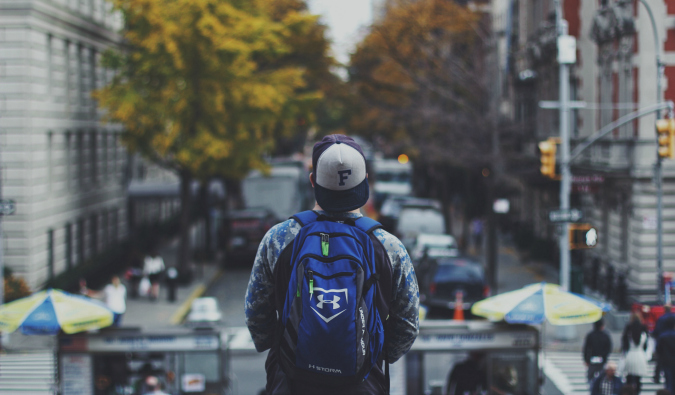
Before my first trip around the world , I was driving through Boston with my friend Mike. I was talking about how excited I was about my upcoming travel and how I was looking forward to seeing all the changes that would happen in Boston while I was away.
Where would my friends be in life? How would they have changed? What jobs would they have? New hobbies? New relationships? What would the city be like?
The possibilities seemed endless.
“Matt, everything will be exactly how you left it,” he said. “Look, when I studied abroad, I thought the same thing. But in truth, nothing will be different when you come home. Everything and everyone will be the same.”
“A lot can happen in a year, Mike.”
“I’m telling you, Matt,” he continued, “life will be just the way you left it. You’ll see.”
When I came back home eighteen months later, I realized that he had been right. While I had changed, home hadn’t. My friends, now heading into their late twenties, still had the same jobs, were going to the same bars, and were mostly doing the same things. They were still the same people I had left before. Moreover, Boston itself just felt the same. It had the same vibe as it had had before. There was still construction everywhere, and the restaurants were still the same.
Mike had been right. While I had grown, home had remained frozen in time.
And while I still loved my friends, family, and city, I realized I didn’t fit into Boston anymore. It felt small to me. I had outgrown living there.
However, the worst part was I now had this fire in me that I couldn’t express to anyone I knew. I yearned to try new things, go new places, and meet new people. But my friends couldn’t understand why I was so depressed about being back. They didn’t want to hear about my trip or all the cool things I did while they had commuted to and from work.
To my parents, it was like I was equivocating on my place of birth. To my friends, it felt as if I was now “too cool” for them.
But it wasn’t that.
As Benjamin Button said, “It’s a funny thing about comin’ home. Looks the same, smells the same, feels the same. You’ll realize what’s changed is you.”
After the initial excitement of being home wore off, I had become restless. I had post-travel depression.
Returning home is hard and few people address the reality that it’s often an anticlimactic end to a life-changing experience.
After a year of mind-blowing adventures, you‘re back where you started — sitting on a couch, back in your apartment or your old bedroom, bored, anxious, and jittery. Your friends don’t understand the new you, don’t want to hear your stories, or don’t get why you feel so uncomfortable.
“What? You don’t like it here anymore?” they’ll ask.
But it’s not that you don’t like it.
It’s just that you went from 100 to 0 faster than you can process.
You feel as if you came back to the exact spot you left. You’ve gone from backpacking the world and trekking in jungles to sitting in a cubicle. One minute you’re your dream you, the next you’re the old one back in an office that yearned to be free. And you feel like you never really escaped your old life after all.
And that’s depressing.
Anyone who has ever traveled the world has felt this.
After you come home, when the initial hugs are hugged out, the stories told (to those who will listen), and the reunions over, many of us find that our true home is being surrounded by the unknown.
Every time a friend comes home from traveling, their first question to me is always, “How do you cope with post-travel depression?”
There is no real cure for the post-trip blues. The only real way to get over post-trip depressions is to stay busy. You talk people online, go to meet-ups, or plan your next trip . Keep that energy you had on the road going. Go out, sightsee in your own town, take road trips, find a hobby… do something. Because the more you stay still, the worse your depression will be.
But it only ever fades as more time passes. There’s no cure other than time. It’s like getting over a relationship. Sure, you can stay busy but it’s only as time progresses that you slowly begin to move on.
When you were traveling, you viewed every moment as an adventure. View your life back home as one too. Stay busy. Stay active. Try new things. Keep that can do attitude.
When you do that, home will feel a little less suffocating.
Book Your Trip: Logistical Tips and Tricks
Book Your Flight Find a cheap flight by using Skyscanner . It’s my favorite search engine because it searches websites and airlines around the globe so you always know no stone is being left unturned.
Book Your Accommodation You can book your hostel with Hostelworld . If you want to stay somewhere other than a hostel, use Booking.com as it consistently returns the cheapest rates for guesthouses and hotels.
Don’t Forget Travel Insurance Travel insurance will protect you against illness, injury, theft, and cancellations. It’s comprehensive protection in case anything goes wrong. I never go on a trip without it as I’ve had to use it many times in the past. My favorite companies that offer the best service and value are:
- SafetyWing (best for everyone)
- Insure My Trip (for those 70 and over)
- Medjet (for additional evacuation coverage)
Want to Travel for Free? Travel credit cards allow you to earn points that can be redeemed for free flights and accommodation — all without any extra spending. Check out my guide to picking the right card and my current favorites to get started and see the latest best deals.
Need Help Finding Activities for Your Trip? Get Your Guide is a huge online marketplace where you can find cool walking tours, fun excursions, skip-the-line tickets, private guides, and more.
Ready to Book Your Trip? Check out my resource page for the best companies to use when you travel. I list all the ones I use when I travel. They are the best in class and you can’t go wrong using them on your trip.
Got a comment on this article? Join the conversation on Facebook , Instagram , or Twitter and share your thoughts!
Disclosure: Please note that some of the links above may be affiliate links, and at no additional cost to you, I earn a commission if you make a purchase. I recommend only products and companies I use and the income goes to keeping the site community supported and ad free.
Related Posts

Get my best stuff sent straight to you!
Pin it on pinterest.
How to get over your post-vacation blues

We all know that feeling: the one when you return home from a fabulous trip and struggle to reacclimatize to everyday life. Post-travel hangovers can leave you exhausted, unmotivated, or blue (if not all three). But with a few simple tips and tricks, you can beat the inertia, dive right back into a productive routine, and even infuse your home life with the excitement and inspiration you felt while you were away. Read on for 10 ways to prevent that next vacation hangover.
Do this, if nothing else: Unpack your bags as soon as possible. While you might tell yourself that tomorrow is just as good as today to begin the annoying (and potentially heartbreaking) process of removing all signs of your recent trip, you're really just fooling yourself. Each day that you let your unpacked suitcase take up space in the corner of your bedroom is another day that you're not fully committing yourself to the present time and place.
Leaving a mountain of dirty vacation clothes in your hamper is almost as bad as leaving it in your suitcase. Take some time to launder, fold and put away the bathing suits and shorts that are only serving as painful midwinter reminders of the 80-degree weather you were basking in just a few days ago.
Go grocery shopping
Your fridge is most likely empty—or smelling funky from that spinach you forgot to throw away before you left—so clean it out, then head to the grocery store and stock up on your regular essentials. It may seem like a small thing, but having your go-to snacks and food items right where you're used to seeing them will go a long way toward making your house seem like home again.
Detox from vacation food
One of the best parts of traveling is trying out new foods and savoring every last special treat. But when you get back, your body will probably be craving fruits and veggies, so give it what it needs. Take a break from rich, heavy feasts by avoiding takeout and preparing a few healthy dinners yourself. While it might seem ho-hum after a week of dressing up for fancy out-of-town restaurants, making a meal in your own kitchen can really help you settle back in and get a healthier eating routine back on track.
Get some exercise
Beat the post-travel blues by releasing some endorphins via physical activity, whether it's getting back into the swing of your yoga-class schedule or going on a run. The disappointment you might feel as a result of your vacation's end can lead to the feeling that nothing—aside from getting on a plane and heading straight back—can bring about that same energy again. Blast away those thoughts with a good workout session and remind yourself that there are many ways to get that feel-good boost.
Balance your budget
Make sure to check your bank-account balance as soon as you get home, if you weren't already keeping up with it while you were away. Not only will your travel spending inform your budget decisions for the immediate future, but you'll want to take a close look at your statement—while the recent charges are still fresh in your mind—to make sure there are no transactions you need to dispute.
Organize your photos
Wait too long to unload, edit and share your travel photos and you'll run the risk of forgetting the rich details of your trip. Don't let your camera collect dust: Block out a few hours and organize your snaps. Instead of mourning the loss of those scenic vistas, relive your vacation by making a photo album that serves as a reminder of why you love to travel.
Beat the jet lag
On your first Monday back in the office, don't give in to that urge to crawl under your desk and take a nap at 2 p.m. Instead, fight your jet lag by going to bed at the normal hour for your current location (taking melatonin or sleep aids if necessary) and staying hydrated. Or, fight jet lag before it even starts; read SmarterTravel's tips for avoiding jet lag .
Nurse your reverse culture shock
To beat that "What am I doing in [insert boring place] when I could be back in [insert fabulous vacation destination]?" feeling, try to remind yourself of the things that you love about your hometown. What that means is entirely subjective, but it could be anything from taking a walk through a nearby park to catching up with friends at your favorite neighborhood bar. Just remember that if you were always on vacation, there'd be nothing left to look forward to (and you'd be very broke).
Plan the next one
In the midst of this thrust to readjust to regular life, make sure you take time to reflect on your trip and share the details of your getaway with friends and family. Think about everything you learned and what you most want to take away from the experience. And then start planning again! There's no better way to cure a travel hangover than to pull out a map, do some research and get excited about the amazing adventures to come.

Some articles on Fair Dinkum traveller may contain compensated links. Please read the disclaimer for more information.
Dealing with Post-Vacation Depression: How to Get Over the Blues
Jul 25, 2022 | Feature | 0 comments

We’ve all been there, the nasty post-travel blues that hit you like a tonne of bricks. You come back from a great vacation, and suddenly you feel terrible. All the energy and excitement you felt before your trip has vanished, and you’re left depressed and anxious.
This is known as post-vacation depression, a genuine phenomenon.
Is there a cure? For the everyday people who need to return to their real jobs, possibly not, we each hang out for the next lot of annual leave until we can spread our wings and fly once more.
This article discusses ways to deal with post-vacation depression and get your life back on track!
Beat post-travel blues and go on a holiday again; find a hotel at booking.com!

Dealing with Post-Vacation Depression: How to Get Over the Blues when not travelling.
Is post-travel blues the end of the world? No, but it can feel like it and sometimes you may feel foolish feeling this way when there are more significant problems in the world than your travel obsession.
However, the travel blues do exist, whether it’s a big deal or not. Every individual is different and faces reality in different ways.
So how do you deal with post-vacation depression? Let’s discuss a few scenarios to get you back into the real world again.
Accept how you feel with the travel blues.
The first step is to accept that you’re feeling this way. It’s perfectly natural to feel a little down after returning from a trip, especially if it was somewhere you loved.
Don’t beat yourself up for feeling this way, and don’t try to push the feelings away. Accepting them is the first step to dealing with them.
Talk about your experiences with others.
Has it gone this far where you need to talk about post-vacation depression? It’s OK to talk to others about your feelings; it can be pretty therapeutic.
When you’re feeling down, it can be helpful to talk to someone who will understand what you’re going through. Talk to a friend or family member who has also been on a great trip or read travel blogs to get some vicarious thrills.
Do something that makes you happy.
Sometimes it’s hard to feel this way when you’re about to head to the office and slug it out for the next few months or year until your next vacation.
So what can you do to make yourself feel better in the meantime? Do something that makes you happy! If you love your job, this will be easier, but try and find little things to enjoy in your day-to-day life.
Doing something which makes you happy is an excellent opportunity to do something that makes you happy but that you wouldn’t usually have time for in the real world. Maybe there’s a hobby you’ve wanted to pick up or a place you’ve wanted to visit. Now is the time to do it!
Book another holiday and have another trip to look forward to
Planning another trip is the ultimate way to get over post-vacation depression: book another vacation! If you have the means to travel more often, this may be the best solution for you.
Sure it is a tease to book another holiday which is further into the future but having something to look forward to is a great way to deal with post-vacation depression.

Book another vacation and see fabulous destinations like Kyoto in Japan.
Have short getaways close to home
Try and find short weekend or day trips that you can do to tide you over until your next big adventure. Close-to-home vacations are a great way to get over post-vacation depression if you can’t afford to travel immediately or if you don’t have the time.
It could surprise you how many beautiful things there are to see close to home that require a night or two stay. It also breaks your usual routine of going to week work and sending the weekend at home completing daily chores.
Get back into a routine.
Returning to reality isn’t the most exciting way to get over the travel blues, but getting back into a routine can help. A habit is ultimately something we all must do after a holiday, and the sooner you face the reality of the natural world, the easier it will be for you upon return to work.
Your body and mind are used to being on vacation mode, and it can be hard to transition back into work mode or regular life. Try and ease yourself back into it by starting with shorter work days, if possible, or planning fun activities after work.
Look back on the memories of your recent trip.
Is this routine-wise, or is it too much of a tease? It is best to find a happy medium.
You can reflect on your recent trip by looking through pictures or videos or writing in a journal about all the great things you did. Reflection on your past trip will help you remember all the good times you had and why you travelled in the first place.
It can also be helpful to look back on old travel memories to get you excited for future trips. Remember, post-vacation depression is only temporary! Soon enough, you’ll pack your bags again and make new memories.
There’s no place like home.
Ultimately, this is the most important thing you need to remember, you’re home, and there’s no place like home.
Yes, you might miss the excitement of your recent trip, but you’re also surrounded by the people and things you love. Appreciate all the good things about being home, and post-vacation depression will soon fade away.
Change jobs
This scenario is unrealistic, but why not have a moment in your life where you think about the future and where you desire to be in life. If post-vacation depression is something that hits you hard every time, maybe it’s time for a change.
A new job or even a new career might be just what you need to get over the post-travel blues. If your current job isn’t making you happy, look for others who will mentally and emotionally fulfil you.
A change of scenery can be just what you need to get out of your post-vacation slump, so don’t be afraid to take risks! You may find a job requiring travel; how cool would this be?
Post-vacation depression is brutal, but there are ways to get through it. Just remember to take things one day at a time, do something that makes you happy, and appreciate all the good things about being home. Soon enough, you’ll be planning your next adventure!
What are your favourite ways of dealing with post-vacation depression? Let us know in the comments below!

Don’t have the travel blues; get back in the routine until you travel again.
Submit a Comment Cancel reply
Your email address will not be published. Required fields are marked *
This site uses Akismet to reduce spam. Learn how your comment data is processed .

Get Your Free E-Book Today!
Stay in the loop with our monthly newsletter! Get expert travel tips and destination advice, and snag a free E-Book!
You have Successfully Subscribed!
We noticed you're visiting from United States (US). We've updated our prices to United States (US) dollar for your shopping convenience. Use Australian dollar instead. Dismiss
- Warning Signs and Symptoms
- Mental Health Conditions
- Common with Mental Illness
- Mental Health By the Numbers
- Individuals with Mental Illness
- Family Members and Caregivers
- Kids, Teens and Young Adults
- Veterans & Active Duty
- Identity and Cultural Dimensions
- Frontline Professionals
- Mental Health Education
- Support Groups
- NAMI HelpLine
- Publications & Reports
- Podcasts and Webinars
- Video Resource Library
- Justice Library
- Find Your Local NAMI
- Find a NAMIWalks
- Attend the NAMI National Convention
- Fundraise Your Way
- Create a Memorial Fundraiser
- Pledge to Be StigmaFree
- Awareness Events
- Share Your Story
- Partner with Us
- Advocate for Change
- Policy Priorities
- NAMI Advocacy Actions
- Policy Platform
- Crisis Intervention
- State Fact Sheets
- Public Policy Reports
- About Mental Illness
Depressive disorder, frequently referred to simply as depression, is more than just feeling sad or going through a rough patch. It’s a serious mental health condition that requires understanding and medical care. Left untreated, depression can be devastating for those who have it and their families. Fortunately, with early detection, diagnosis and a treatment plan consisting of medication, psychotherapy and healthy lifestyle choices, many people can and do get better.
Some will only experience one depressive episode in a lifetime, but for most, depressive disorder recurs. Without treatment, episodes may last a few months to several years.
About 21 million U.S. adults— 8.4% of the population—had at least one major depressive episode in 2020. People of all ages and all racial, ethnic and socioeconomic backgrounds experience depression, but it does affect some groups more than others.
Personal Perspectives On Major Depressive Disorder
In this 2-part podcast series, NAMI Chief Medical Officer Dr. Ken Duckworth guides discussions on major depressive disorder that offer insights from individuals, family members and mental health professionals. Read the transcript . Note: Content includes discussions on topics such as suicide attempts and may be triggering.
Depression can present different symptoms, depending on the person. But for most people, depressive disorder changes how they function day-to-day, and typically for more than two weeks. Common symptoms include:
- Changes in sleep
- Changes in appetite
- Lack of concentration
- Loss of energy
- Lack of interest in activities
- Hopelessness or guilty thoughts
- Changes in movement (less activity or agitation)
- Physical aches and pains
- Suicidal thoughts
Depression does not have a single cause. It can be triggered by a life crisis, physical illness or something else—but it can also occur spontaneously. Scientists believe several factors can contribute to depression:
- Trauma . When people experience trauma at an early age, it can cause long-term changes in how their brains respond to fear and stress. These changes may lead to depression.
- Genetics . Mood disorders, such as depression, tend to run in families.
- Life circumstances . Marital status, relationship changes, financial standing and where a person lives influence whether a person develops depression.
- Brain changes . Imaging studies have shown that the frontal lobe of the brain becomes less active when a person is depressed. Depression is also associated with changes in how the pituitary gland and hypothalamus respond to hormone stimulation.
- Other medical conditions . People who have a history of sleep disturbances, medical illness, chronic pain, anxiety and attention-deficit hyperactivity disorder (ADHD) are more likely to develop depression. Some medical syndromes (like hypothyroidism) can mimic depressive disorder. Some medications can also cause symptoms of depression.
- Drug and alcohol misuse . Adults with a substance use disorder are at significantly higher risk for experiencing a major depressive episode. Co-occurring disorders require coordinated treatment for both conditions, as alcohol can worsen depressive symptoms.
To be diagnosed with depressive disorder, a person must have experienced a depressive episode lasting longer than two weeks. The symptoms of a depressive episode include:
- Loss of interest or loss of pleasure in all activities
- Change in appetite or weight
- Sleep disturbances
- Feeling agitated or feeling slowed down
- Feelings of low self-worth, guilt or shortcomings
- Difficulty concentrating or making decisions
- Suicidal thoughts or intentions
Although depressive disorder can be a devastating illness, it often responds to treatment. The key is to get a specific evaluation and treatment plan. Safety planning is important for individuals who have suicidal thoughts. After an assessment rules out medical and other possible causes, a patient-centered treatment plans can include any or a combination of the following:
- Psychotherapy including cognitive behavioral therapy, family-focused therapy and interpersonal therapy.
- Medications including antidepressants, mood stabilizers and antipsychotic medications.
- Exercise can help with prevention and mild-to-moderate symptoms.
- Brain stimulation therapies can be tried if psychotherapy and/or medication are not effective. These include electroconvulsive therapy (ECT) for depressive disorder with psychosis or repetitive transcranial magnetic stimulation (rTMS) for severe depression.
- Light therapy , which uses a light box to expose a person to full spectrum light in an effort to regulate the hormone melatonin.
- Alternative approaches including acupuncture, meditation, faith and nutrition can be part of a comprehensive treatment plan.
Reviewed August 2017
Many treatment options are available for depression, but how well treatment works depends on the type of depression and its severity. For most people, psychotherapy and medications give better results together than either alone, but this is something to review with your mental health care provider.
Psychotherapy
Psychotherapy (or talk therapy) has an excellent track record of helping people with depressive disorder. While some psychotherapies have been researched more than others, many types can be helpful and effective. A good relationship with a therapist can help improve outcomes.
Many clinicians are trained in more than one kind of psychotherapy, so ask your clinician what kind of psychotherapy they practice and how it can help you. A few examples include:
- Cognitive behavioral therapy (CBT) has a strong research base to show it helps with symptoms of depression. This therapy helps assess and change negative thinking patterns associated with depression. The goal of this structured therapy is to recognize negative thoughts and to teach coping strategies. CBT is often time-limited and may be limited to 8–16 sessions in some instances.
- Interpersonal therapy (IPT) focuses on improving problems in personal relationships and other changes in life that may be contributing to depressive disorder. Therapists teach individuals to evaluate their interactions and to improve how they relate to others. IPT is often time-limited like CBT.
- Psychodynamic therapy is a therapeutic approach rooted in recognizing and understanding negative patterns of behavior and feelings that are rooted in past experiences and working to resolve them. Looking at a person’s unconscious processes is another component of this psychotherapy. It can be done in short-term or longer-term modes.
Psychoeducation And Support Groups
Psychoeducation involves teaching individuals about their illness, how to treat it and how to recognize signs of relapse. Family psychoeducation is also helpful for family members who want to understand what their loved one is experiencing.
Support groups, meanwhile, provide participants an opportunity to share experiences and coping strategies. Support groups may be for the person with the mental health condition, for family/friends or a combination of both. Mental health professionals lead some support groups, but groups can also be peer-led.
Explore NAMI’s nationwide offerings of free educational programs and support groups that provide outstanding education, skills training and support.
Medications
For some people, antidepressant medications may help reduce or control symptoms. Antidepressants often take 2-4 weeks to begin having an effect and up to 12 weeks to reach full effect. Most people will have to try various doses or medications to find what works for them. Here are some antidepressants commonly used to treat depression:
Selective serotonin reuptake inhibitors (SSRIs) act on serotonin, a brain chemical. They are the most common medications prescribed for depression.
- Fluoxetine (Prozac)
- Sertraline (Zoloft)
- Paroxetine (Paxil)
- Citalopram (Celexa)
- Escitalopram (Lexapro)
Serotonin and norepinephrine reuptake inhibitors (SNRIs) are the second most common antidepressants. These medications increase serotonin and norepinephrine.
- Venlafaxine (Effexor)
- Desvenlafazine (Pristiq)
- Duloxetine (Cymbalta)
Norepinephrine-dopamine reuptake inhibitors (NDRIs) increase dopamine and norepinephrine. Bupropion (Wellbutrin) is a popular NDRI medication, which causes fewer (and different) side effects than other antidepressants. For some people, bupropion causes anxiety symptoms, but for others it is an effective treatment for anxiety.
Mirtazapine (Remeron) targets specific serotonin and norepinephrine receptors in the brain, thus indirectly increasing the activity of several brain circuits. Mirtazapine is used less often than newer antidepressants (SSRIs, SNRIs and bupropion) because it is associated with more weight gain, sedation and sleepiness. However, it appears to be less likely to result in insomnia, sexual side effects and nausea than the SSRIs and SNRIs.
- Bupropion (Wellbutrin)
- Mirtazapine (Remeron)
Second-generation antipsychotics (SGAs) , or “atypical antipsychotics,” treat schizophrenia, acute mania, bipolar disorder and bipolar mania and other mental illnesses. SGAs can be used for treatment-resistant depression.
- Aripiprazole (Abilify)
- Quetiapine (Seroquel)
Tricyclic antidepressants (TCAs) are older medications, seldom used today as initial treatment for depression. They work similarly to SNRIs but have more side effects. They are sometimes used when other antidepressants have not worked. TCAs may also ease chronic pain.
- Amitriptyline (Elavil)
- Desipramine (Norpramin)
- Doxepin (Sinequan)
- Imipramine (Tofranil)
- Nortriptyline (Pamelor, Avantyl)
- Protriptyline (Vivactil)
Monoamine oxidase inhibitors (MAOIs) are less used today because newer, more effective medications with fewer side effects have been found. These medications can never be used in combination with SSRIs. MAOIs can sometimes be effective for people who do not respond to other medications.
- Phenelzine (Nardil)
- Isocarboxazid (Marplan)
- Tranylcypromine Sulfate (Parnate)
- Selegiline patch (Emsam)
Brain Stimulation Therapies
For some, brain stimulation therapies may be effective, typically after other treatments have not been effective.
- Electroconvulsive Therapy (ECT) involves transmitting short electrical impulses into the brain. ECT does cause some side effects, including memory loss. Individuals should understand the risks and benefits of this intervention before beginning a treatment trial.
- Repetitive Transcranial Magnetic Stimulation (rTMS) is a relatively new type of brain stimulation that uses a magnet instead of an electrical current to activate the brain. It is not effective as a maintenance treatment.
- Vagus Nerve Stimulation (VNS) has a complex history. For a fuller understanding of this treatment, read the NIMH summary of this and other brain stimulation interventions.
Complementary And Alternative Medicine (CAM)
Relying solely on CAM methods is not enough to treat depression, but they may be useful when combined with psychotherapy and medication. Discuss your ideas of CAM interventions with your health care professional to be sure they will not cause side effects or adverse reactions.
The National Center for Complementary and Integrative Health reviews research on complementary treatments. You can search for each intervention on their website .
- Exercise. Studies show that aerobic exercise can help treat mild depression because it increases endorphins and stimulates norepinephrine, which can improve a person’s mood.
- Folate . Some studies have shown that when people with depression lack folate (also called folic acid or vitamin B9), they may not be receiving the full benefit from any antidepressants they may be taking. Studies suggest that in some situations taking L-methylfolate (an active form of folate) can be an additional treatment with other psychiatric medications.
- St John’s Wort. This supplement has similar chemical properties to some SSRIs. Risks of combining St John’s Wort with SSRIs and other medications are well-known and substantial.
Experimental Treatments
These following treatments are not FDA-approved but are being researched:
- Ketamine. Ketamine, which may offer a new model in treating depression, may have potentially quick and short-term impact on depression and suicidal thoughts. Ketamine is an anesthetic with a street value (special K) that has not been studied for long-term use. It can make psychosis worse and is not an ideal choice for people with substance use disorders.
- Deep Brain Stimulation . This treatment has been used to treat Parkinson’s disease. See the NIMH page on brain stimulation for more information .
- I Think I Might Be Gay
Coping with depression isn’t easy, but if you, a family member or a friend is struggling, there is help. NAMI is there to provide support and resources for you and your family.
Helping Yourself
Leading a balanced lifestyle can help you manage symptoms of depression. Here are some suggestions from people who have lived experience with depression:
Learn all you can . Learn about the many treatment options available. Connect with other people experiencing depression in support groups or meetings. Attend local conferences and conventions. Build a personal library of useful websites and helpful books.
Recognize early symptoms . Identify possible warning signs and triggers that may aggravate your depression symptoms. With this knowledge, you can recognize an emerging episode and get the help you need as soon as possible. Don’t be afraid to ask your friends and family for help—they can help you monitor your symptoms and behavior.
Partner with your health care providers . Give your health care provider all the information he or she needs to help you recover—including any reactions to medications, your symptoms or any triggers you notice. Develop trust and communicate openly.
Know what to do in a crisis . Be familiar with your community’s crisis hotline or emergency walk-in center. Know how to contact them and keep the information handy.
Find emotional support from others who experience depression . Share your story , thoughts, fears and questions with other people who have the same condition. Connect through online message boards or peer-education programs like NAMI Peer-to-Peer or support groups like NAMI Connection .
Avoid drugs and alcohol . These substances can disturb emotional balance and interact with medications. You may think using alcohol or drugs will help you feel better, but using them can hinder your recovery or make symptoms worse.
Get physically healthy . Eat well and exercise. To relieve stress, try activities like meditation, yoga or Tai Chi.
Helping A Family Member Or Friend
When someone you love and care about experiences the symptoms of mental illness, you face unique challenges yourself, including complex family dynamics, social isolation and often unpredictable behavior. Getting support for yourself is essential for you to be able to be helpful for the person you care about.
Learn more about your loved one’s condition . Learning about the condition your loved one experiences will help you better understand and support them. Read personal accounts of lived experience, full of tips and advice on the NAMI Blog :
- Depression is an Illness, Not a Weakness
- Living with Depression: How to Keep Working
Recognize early symptoms . Depression often has warning signs, such as a low mood, feeling fatigued or having trouble sleeping. Discuss your friend or family member’s past episodes with them to help them improve their ability to recognize the signs early.
Communicate . Speak honestly and kindly . Don’t scold or blame people with depression or urge them to “try harder” to “just be happy.” Instead, make specific offers of help and follow through with those offers. Tell the person you care about them. Ask them how they feel and truly listen.
React calmly and rationally . Even if your family member or friend is in a crisis, it’s important to remain calm. Listen to their concerns and make them feel understood—then take the next step toward getting help.
Find emotional support from others . Share your thoughts, fears and questions with other people who have loved ones with similar conditions. Connect with others through online message boards or NAMI peer-education programs .

Know the warning signs of mental illness

Learn more about common mental health conditions
NAMI HelpLine is available M-F, 10 a.m. – 10 p.m. ET. Call 800-950-6264 , text “helpline” to 62640 , or chat online. In a crisis, call or text 988 (24/7).

IMAGES
VIDEO
COMMENTS
Keep the buzz of excitement that comes with travel alive by maintaining the mindset of a traveler. Take a cooking class in your hometown, continue with surf lessons, take a dance class or two, and treat yourself to a nice meal every couple of weeks or so. Continue to 5 of 11 below. 05 of 11.
taking deep breaths through the nose and exhaling through the mouth, while counting. taking a walk and engaging the senses to notice the surroundings. eating slowly and savoring each bite to ...
The best way to relieve post-vacation depression is by allowing yourself to fully relax and decompress on vacation. Having future trips or things to look forward to will also help counter any ...
Encourage the explorer in yourself! 5. Connect with others. One of the best ways to get over post abroad depression is to be around other people. Isolating yourself can amplify your post travel blues, so get out there and reconnect with your old friends.
Post-vacation depression is feeling sad, down, or blue at the end of or after a vacation. Symptoms can include fatigue, lack of motivation, and worry. Stress at work, dissatisfaction with life, and lack of relaxation while vacationing can all cause post-vacation depression. To cope with post-vacation blues, try easing back to your normal ...
The following tips from our psychiatrists about post-vacation habits can help you get a handle on post-vacation depression and improve your well-being. 1. Confront the major stressors in your life. Sometimes, all it takes is some time away to help you recognize unresolved conflicts at work or home. If coming back from vacation to regular life ...
Focus on eating well, physical activity, rest, and other good self-care activities. Limit the stressors in your life. Though post-travel depression is no fun, remember that this condition is temporary—you have it in you to return to your normal life or make the necessary changes to help ease your sadness and stress.
Published: April 20, 2023. Post vacation depression, while not a clinical term, is defined by three days to two weeks after a vacation in which someone experiences varied symptoms of depression. You may feel a sense of relief to have made it home safely, but still have concurrent feelings of grief because life will return to your usual routine.
Post-vacation depression, also known as holiday blues, is that dread, sadness or anxiety that you can start to feel at the end of your trip or when you get home. Returning home, there can be a lack of motivation to slip back into your daily routine. Wishing you were back scaling mountains, eating tapas, relaxing on beaches, or whatever it was ...
Though it sounds easy, it might bring a feeling of nostalgia. So, it is essential to keep a positive mindset and, therefore, make your memories a weapon against bad mood, depression, and stress. Let memories be your sunshine on a rainy day and your good news on a bad day. 4. Follow the Mindset of a Traveler.
Post-vacation syndrome is a brief period of readjustment that can result in symptoms including depression, exhaustion, and sleepiness, among others. Following a trip, it's crucial to quickly adjust, settle in, and embrace daily routine. Remind yourself that you are exactly where you need to be by bringing yourself into the present.
Try to stick to your usual sleep schedule from home while on vacation, if at all possible. Staying on schedule can help make the transition back to your normal life a little easier. Avoid all alcohol and caffeine for at least three to four hours before you plan on going to bed. 2. Exercise while you're on vacation.
Even if you're a couch potato, get up and start moving! Harvard Medical School reported that a recent study found that " Running for 15 minutes a day or walking for an hour reduces the risk of major depression." So, the third trick to beat post-travel depression is easy: get up and move. 4. Pay attention to your diet.
Signs of Post-Vacation Depression. There's more to depression than extreme sadness, and some depression symptoms might not be that obvious. Understanding the difference between depression vs. sadness is crucial, especially when dealing with post-vacation feelings that might seem overwhelming. With post-vacation depression, the symptoms can often be attributed to simply a lack of motivation ...
Here's how to beat the post-holiday blues. Dr. Daniel Glazer is a clinical psychologist. He says it's common for people to feel down after returning from vacation. He recommends people keep track ...
5 Typical Post Travel Depression Symptoms. The symptoms of post-holiday depression can really include some or even all of the following: anxiety, fatigue, irritability, mood swings, headaches, sleeping too much or too little, change in appetite, weight loss or gain, inability to concentrate, increased desire to be alone, and loss of interest in ...
The post-trip blues can manifest in many ways, from feeling tired after vacation to being unable to sleep. Common symptoms of post-vacation depression: Feeling sad without knowing why; Unexplained, lingering anxiety; Fatigue, trouble sleeping; Irritability ; Lack of motivation; Triggers for post-vacation blues: Change in routine.
There is no real cure for the post-trip blues. The only real way to get over post-trip depressions is to stay busy. You talk people online, go to meet-ups, or plan your next trip. Keep that energy you had on the road going. Go out, sightsee in your own town, take road trips, find a hobby… do something. Because the more you stay still, the ...
Get some exercise. Beat the post-travel blues by releasing some endorphins via physical activity, whether it's getting back into the swing of your yoga-class schedule or going on a run. The ...
Book another holiday and have another trip to look forward to. Planning another trip is the ultimate way to get over post-vacation depression: book another vacation! If you have the means to travel more often, this may be the best solution for you. Sure it is a tease to book another holiday which is further into the future but having something ...
It may feel like you can never get happy, don't enjoy your life anymore, or wish to end your life. If you are feeling suicidal, reach out to the National Suicide Prevention Lifeline today at 1-800-273-TALK (8255). They are available 24/7 to help. You're not alone, and your life is important. Depression is a mental health condition, so it ...
How to Handle Vacation Depression. One thing that research has observed is that, for vacationers, the effects of a vacation aren't permanent and aren't meant to be. We need to eat regularly — we can't eat all the food we'll ever need at once. We need to sleep regularly — we can't get all our sleep for the year in one month (if we ...
Tiredness, loss of appetite, anxious, nostalgia, depression, stress. Causes. Returning home or to a normal routine from a long vacation. Treatment. Time. Frequency. 57% of travellers. Post-vacation blues (Canada and US), post-holiday blues (UK, Ireland and some Commonwealth countries) or post-travel depression ( PTD) is a type of mood that ...
Without treatment, episodes may last a few months to several years. About 21 million U.S. adults— 8.4% of the population—had at least one major depressive episode in 2020. People of all ages and all racial, ethnic and socioeconomic backgrounds experience depression, but it does affect some groups more than others.
Understanding post-stroke depression, its diagnosis, treatment, and impact on quality of life by Dr. Alok Kulkarni, a neuropsychiatrist.
April 13, 2024. Credit: Otsuka. The FDA has approved the first app for treating major depressive disorder, a condition estimated to impact 21% of U.S. adults at some point in their lifetime. The ...